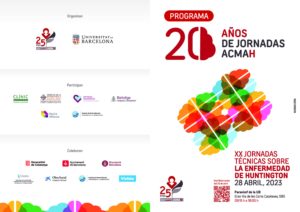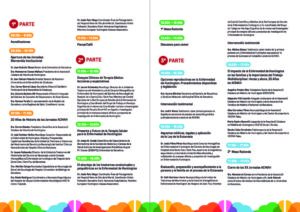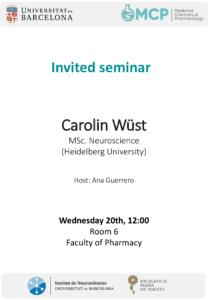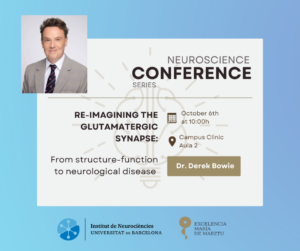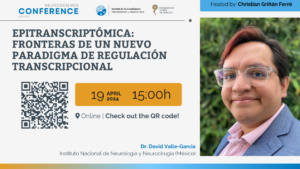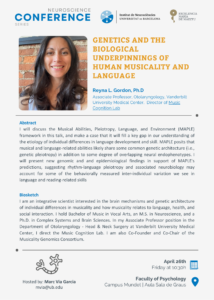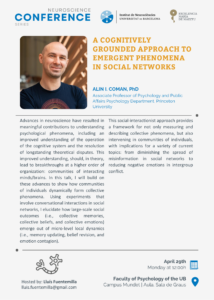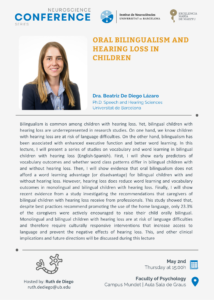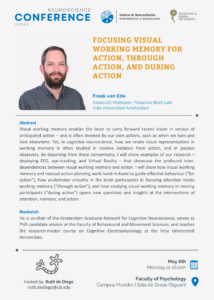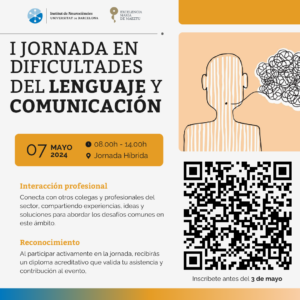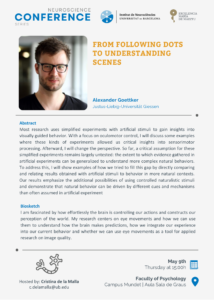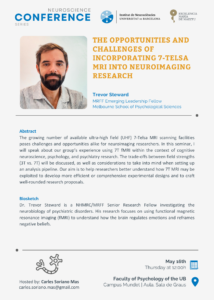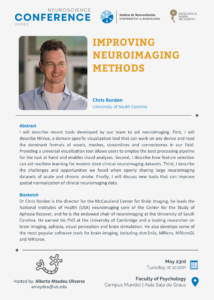-
Mon11Jan20161:00 PMAula 10, Facultat de Medicina, Campus Clínic
Roser Sala
Professor Lector, Unitat de Biofísica i Bioenginyeria, Departament de Biomedicina, Facultat de Medicina i Ciències de la Salut
-
Sun28Aug2016Thu01Sep2016
-
Mon12Sep2016Wed14Sep2016
-
Tue20Sep2016Facultat de Medicina, Campus Clínic. Barcelona
-
Wed28Sep2016Fri30Sep2016
-
Wed28Sep201612:30 PMAula 3, Facultat de Farmacia
El proper dimecres 28 de Setembre, a les 12:30h a l’aula 3 de la Facultat de Farmacia el Prof. Beas-Zarate del Centro Universitario de Ciencias Biológicas y Agropecuarias, Rector de la Universidad de Guadalajarafarà una xerrada titulada “Posibilidades de colaboración en investigación y docencia entre la Universidad e Barcelona y la Universidad de Guadalajara (Mexico)”.
-
Wed28Sep20166:30 PMRoom 1203, Facultat de Psicologia
-
Thu27Oct20163:00 PMSala de Graus, Facultat de Psicologia, Campus Mundet
Josep Marco
Brainvitge- Learning from Reward - Universitat de Barcelona
Good vibrations: brain oscillatory activity associated with reward and prediction error processing
In our daily life we are constantly adapting our behaviour on the basis of the results of our action. We need, therefore, complex mechanisms which allow us to create expectancies about our actions and to evaluate them on the bases of the real outcomes. In this talk we will present two neural oscillatory mechanisms underlying the processing of rewards, punishments and prediction errors and we will consider different accounts on their functional significance.
-
Thu10Nov20163:00 PMSala de Graus, Facultat de Psicologia, Campus Mundet
Karl Gegenfurtner
Department of Psychology - Giessen University
The Interaction Between Vision and Eye Movements
The existence of a central fovea, the small retinal region with high analytical performance, is arguably the most prominent design feature of the primate visual system. This centralization comes along with the corresponding capability to move the eyes to reposition the fovea continuously. Past research on visual perception was mainly concerned with foveal vision while the observers kept their eyes stationary. Research on the role of eye movements in visual perception emphasized their negative aspects, for example, the active suppression of vision before and during the execution of saccades. But is the only benefit of our precise eye movement system to provide high acuity of the small foveal region, at the cost of retinal blur during their execution? In this review, I will compare human visual perception with and without saccadic and smooth pursuit eye movements to emphasize different aspects and functions of eye movements. I will show that the interaction between eye movements and visual perception is optimized for the active sampling of information across the visual field and for the calibration of different parts of the visual field. The movements of our eyes and visual information uptake are intricately intertwined. The two processes interact to enable an optimal perception of the world, one that we cannot fully grasp by doing experiments where observers are fixating a small spot on a display.
-
Mon21Nov2016Fri25Nov20163:30 PMReial Acadèmia de Medicina
Objectius: Al final del curs, els participants inscrits tindran coneixements bàsics de les tècniques optogenètiques i quimiogenètiques, de possibles aplicacions experimentals i clíniques així com del disseny primari d’experiments per al mapeig de circuits neuronals.
-
Thu24Nov20163:00 PMSala de Graus, Facultat de Psicologia, Campus Mundet
Patrick Haggard
Action and Body Research Group, Institute of Cognitive Neuroscience
University College London
New approaches to volition
We feel we decide for ourselves what to do. We also feel that our decisions and intentions lead to our physical actions. Indeed, our culture and society seem to be built upon a concept of individuals as autonomous, conscious, responsible agents. However, neuroscience has often struggled with the idea of voluntary action. One key problem for mechanistic accounts of volition arises in trying to define the origin of voluntary actions in the brain. Second, few neuroscientific accounts have captured the "sense of agency" that characteristically accompanies human goal-directed action. I will report recent experimental work tackling both of these problems. I hope to show that intentional action is a neural mechanism in the human brain, and that it can be studied experimentally.
-
Thu15Dec2016
-
Thu15Dec20163:00 PMSala de Graus, Facultat de Psicologia, Campus Mundet
Iria SanMiguel
Brainlab, Predictive Processes in Motor-Sensory Interactions - Universitat de Barcelona
-
Wed11Jan20171:00 PMAula 10, Facultat de Medicina, Campus Clínic
Dra. Roser Sala
Professor Lector, Unitat de Biofísica i Bioenginyeria, Departament de Biomedicina, Facultat de Medicina i Ciències de la Salut
-
Thu12Jan20173:00 PMSala de Graus, Facultat de Psicologia, Campus Mundet
-
Thu26Jan20173:00 PMSala de Graus, Facultat de Psicologia, Campus Mundet
Dani Linares
VISCA GROUP – Active Perception and Sensorimotor Integration, Universitat de Barcelona
-
Wed08Feb20171:00 PMAula 14, Facultat de Medicina, Campus Clínic
Dr. Miquel Bosch
Researcher
Institute for Bioengineering of Catalonia (IBEC) -
Thu09Feb20173:00 PMSala de Graus, Facultat de Psicologia, Campus Mundet
Marc Schoenwiesner
Professor of Neurobiology, Department of biology
University of Leipzig
Download Marc Shoenwiesner's talk information
-
Thu23Feb20173:00 PMAula de Graus, Facultat de Psicologia, Campus Mundet
Mel Slater
ICREA Research Professor at the Event Lab,
University of Barcelona
Download the poster presentation Mel Slater
-
Thu09Mar20173:00 PMAula de Graus, Facultat de Psicologia, Campus Mundet
Given by Maria Chait
Reader in Auditory Cognitive Neuroscience
UCL Ear Institute
Download the poster presentation Maria Chait
-
Mon13Mar2017Thu16Mar20179:00 AMBiblioteca de la Unitat de Psicologia Quantitativa. Facultat de Psicologia. Campus Mundet
Organiza: GEIMAC
Inscripción gratuita y necesaria para poder obtener el certificado del Instituto de Ciencias de la Educación (ICE). Hasta el 12 de marzo del 2017.
Para más información: ICF WORKSHOP_2017
-
Thu30Mar20171:00 PMSala de Graus, Facultat de Psicologia. Campus Mundet
Organitza: Escola de Doctorat
Conferències sobre beques disponibles, oportunitats a l'estranger i procés emprenedor.
-
Wed05Apr20171:00 PMAula 7, Faculty of Medicine. Campus Clínic
Given by Dra. Amanda Sierra
Ikerbasque Research Professor
Achucarro Basque Center for Neuroscience
-
Thu06Apr20173:00 PMAula de Graus, Facultat de Psicologia, Campus Mundet
Given by Rafael Malach
Department of Neurobiology
Weizmann Institute of Science, Rehovot, Israel
Download the poster presentation Rafael Malach
-
Wed19Apr20171:00 PMAula 11, Facultat de Medicina, Campus Clínic
Dr. Antohny Hickey
Associate Professor, School of Biological Science, The University of Auckland, New Zealand
-
Thu20Apr20173:00 PMSala de Graus, Facultat de Psicologia, Campus Mundet
Ruth de Diego-Balaguer
ICREA, University of Barcelona
Cognition and Brain Plasticity Unit, IDIBEL
For further information please download poster's talk "Ruth de Diego".
-
Wed10May20171:00 PMAula 10, Facultat de Medicina, Hospital Clínic
Seminar by Daniel Closa (CSIC)
-
Thu18May20173:00 PMSala de Graus, Facultat de Psicologia, Campus Mundet
Lluís Fuentemilla Garriga
Associate Professor
BRAINVITGE – Dynamics of Memory Formation
University of BarcelonaFor further information download poster.
-
Thu01Jun20171:00 PMSala de Graus, Faculty of Biology
-
Fri09Jun201710:30 AMSala d'Actes Pau Viladiu de l'Hospital Duran i Reynals
-
Wed14Jun20171:00 PMAula 16, Facultat de Medicina
Iria Carballo Carbajal, PhD
-
Fri16Jun20171:00 PMSala de Juntes, Faculty of Psychology, Mundet Campus
-
Sun18Jun2017Wed21Jun2017Alimara Hotel. Carrer de Berruguete, 126, 08035 Barcelona
-
Thu29Jun20173:00 PMAula 17, Facultat de Medicina
Daniel Öhlund
Umea University -
Fri30Jun20171:00 PMAula 13, Faculty of Medicine
-
Wed12Jul20171:00 PMAula 10, Faculty of Medicine, Hospital Clínic
Given by Dra. Carmen Gallego,
CSIC-IBMB
-
Fri14Jul20171:00 PMSala de Graus, Faculty of Biology
-
Wed19Jul201712:00 PMAula 11, Faculty of Medicine
Given by Dr. Yung Moodley
Lung Institute
-
Fri15Sep20171:00 PMSala de Graus, Faculty of Psychology
-
Fri15Sep20171:00 PMAula 10, Facultat de Medicina, Campus Clínic
Dr. Reza Sharif Naeini - McGill University
-
Wed27Sep201710:00 AMAula 1105, Facultat de Psicologia, Campus Mundet
Important: L'acte es celebrarà a l'Aula 1105 de 10:00h a 20:00h. Recordeu portar DNI/NIE
-
Fri29Sep20171:00 PMAula Magna, Faculty of Medicine
-
Thu19Oct20171:00 PMSala Actes Pavelló de Govern, Bellvitge Campus
-
Tue24Oct20174:20 PMAula Magna Facultat Medicina I Ciències de la Salut - Clínic)
-
Fri27Oct20171:00 PMSala de Graus, Faculty of Psychology
-
Mon06Nov20172:00 PMAula 1103, Facultat de Psicologia, Campus Mundet
Important: Recordeu portar DNI/NIE
-
Wed08Nov20171:00 PMAula 14, Faculty of Medicine and Health Sciences
Dr. Eulalia Marti (Centre for Genomic Regulation)
-
Fri10Nov20171:00 PMAula 14, Faculty of Medicine
-
Wed15Nov20176:15 PMAula Magna de la Facultat de Medicina i Ciències de la Salut
Brenda Penninx(conferència en anglès) i David Bartrés-Faz (conferència en català)
Entrada lliure, no cal inscripció
Més informació -
Wed22Nov20179:30 AMSaló de Graus i Sala de Professors de la Facultat de Dret
-
Thu23Nov20171:00 PMSala Actes Pavelló de Govern, Bellvitge Campus
-
Thu30Nov2017Fri01Dec2017Biology Faculty, University of Barcelona
-
Fri15Dec20171:00 PMAula Magna, Edifici del Teatre, Campus Mundet
-
Wed17Jan20181:00 PMAula 11. Facultat de Medicina. Campus Medicina-Clínic
Guillermo Garcia Alias, PhD
Universitat Autònoma de Barcelona & Institut Guttmann de Neurorehabilitació
-
Wed24Jan201812:30 PMAula 3. Fac. De Farmàcia i Ciències de l’Alimentació
Dr. Daniel Ortuño Sahagún
Instituto de Investigación en Ciencias Biomédicas (IICB), Centro Universitario de Ciencias de la Salud, Universidad de Guadalajara.
-
Tue06Feb2018Institut d'Estudis Catalans - Sala Prat de la Riba (C/ del Carme 47 - 08001 - Barcelona)
Full programme
-
Tue20Feb2018Institut d'Estudis Catalans - Sala Prat de la Riba (C/ del Carme 47 - 08001 - Barcelona)
Full programme
-
Tue27Feb20183:00 PMSala de Graus, Facultat de Psicologia, Campus Mundet
Charo Rueda - University of Granada
Download Barcelona Lecture Series Programme 17-18
Download the abstract Charo_Rueda
-
Tue27Feb20183:00 PMEsteve Auditorium, CEK Building
Dr. Josep Valls
-
Mon05Mar20181:00 PMAula 11, Facultat de Medicina, Campus Clínic
Dr. Daniel Ferreira
Karolinska Institute, Sweden
-
Thu08Mar2018Fri09Mar201811:00 AMPalau de les Heures, Campus Mundet, Universitat de Barcelona
-
Wed14Mar20181:00 PMAula 7, Facultat de Medicina, Campus Clínic
Dr. Pablo Méndez García
Instituto Cajal. CSIC
-
Thu15Mar201811:00 AMSala d’actes del Pavelló de Govern. Facultat de Medicina i Ciències de la Salut. Campus de Bellvitge
-
Thu15Mar20181:00 PMAula 10, Faculty of Medicine, Hospital Clínic
Given by Dr. Aitor Hierro
Structural Biology Unit at CIC bioGUNE
-
Thu22Mar20183:00 PMSala de Graus, Facultat de Psicologia, Campus Mundet
Jordi Navarra, Fundació Sant Joan de Déu, University of Barcelona
-
Fri30Mar20183:00 PMAula de Graus, Facultat de Psicologia, Campus Mundet
Given by Marco Cicchini
Post-Doc in Cognitive Science, Institute of Neuroscience
National Research Council
Download the poster presentation Cicchini
-
Mon09Apr20189:15 AMSaló de Graus, Facultat de Dret, Universitat de Barcelona
-
Wed11Apr20181:00 PMAula 6, Facultat de Medicina, Campus Clínic
Dr Alexandre Calon
Institut Hospital del Mar d'Investigacions Mèdiques
-
Thu12Apr20183:00 PMSala de Graus, Facultat de Psicologia, Campus Mundet
-
Tue08May20183:30 PMAuditori Dr. J. Plaza, Hospital Sant Joan de Déu Barcelona
-
Thu10May20183:00 PMSala de Graus, Facultat de Psicologia, Campus Mundet
-
Fri11May201809:00 - 14:00Edifici Històric de la Universitat de Barcelona
Dins del marc de la Festa de la ciència de la UB, investigadors de l'Institut de Neurociències oferiran demostracions i tallers pràctics.
-
Tue15May20187:30 AMHüle Bar, Bonavista 6, Barcelona
Cristina Malagelada
Universitat de Barcelona
-
Tue22May201812:00 PMAula 210. Aulari del Campus de Ciències de la Salut de Bellvitge
Neus Martínez-Abadías, PhD
-
Wed30May20186:30 AMAula 106, Facultat de Farmàcia i Ciències de l'Alimentació
Prof. Dra. Márcia Regina Cominetti
-
Thu31May20183:00 PMSala de Graus, Facultat de Psicologia, Campus Mundet
-
Wed06Jun20181:00 PMAula Magna Facultat Medicina i Ciències de la Salut - Campus Clínic
Salvador Martínez, MD, PhD
-
Thu07Jun20183:00 PMSala de Graus, Facultat de Psicologia, Campus Mundet
-
Mon11Jun2018Fri22Jun2018Sala d'Exposicions, Facultat de Belles Arts
dill-div matí de 12-14 h, i dilluns i dimecres de 16-20 h
-
Tue12Jun2018Mon02Jul2018
Exclusive for Institute Members
-
Wed13Jun20181:00 PMAula 11, Campus Clínic
Dr. Joaquim Raduà
-
Thu21Jun2018Fri22Jun2018Auditorium, CaixaForum Barcelona
This conference is organised by The Human Brain Project.
-
Wed27Jun2018
-
Thu28Jun2018Fri29Jun2018Facultat de Psicologia, Blanquerna-URL (c/ Císter, 34)
-
Wed04Jul20181:00 PMAula Graus (Aula 14), Medicine Campus (Hospital Clínic)
Jose A. Esteban, PhD
Centro de Biología Molecular Severo Ochoa- CSIC-Universidad Autónoma de Madrid
-
Thu05Jul2018
-
Tue10Jul201811:00 AMAula Master, Mundet Campus
Jean-Philippe Laurenceau, Ph.D., University of Delaware
-
Thu19Jul20181:00 PMAula Magna, Edifici Històric de la UB
Inscripció (dirigit a personal de la UB interessat en la divulgació científica)
-
Tue18Sep20183:00 PMSala de Graus, Mundet Campus
Neuroscience Conference Series "Computational principles of the attenuation of self-generated touch"
-
Thu27Sep201812:00 PMAula 11, Medicine Campus
Dr Jose Segovia,
Departamento de Fisiología, Biofísica y Neurociencias, Centro de Investigación y de Estudios Avanzados del IPN (CINVESTAV), México
-
Sun30Sep20184:00 PMAula de Graus del Pavelló de Govern de la Fac. Medicina UB, campus Bellvitge
-
Fri05Oct201812:00 PMSala d’Actes del Pavelló de Govern, Bellvitge Health Sciences Campus
Mathieu Beraneck, PhD
Centre Neurophysique, Physiologie et Pathologie, CNRS, France
-
Sat06Oct2018Tue09Oct2018
-
Tue16Oct2018Wed17Oct2018Faculty of Medicine and Health Sciences, Medicine Campus, University of Barcelona
-
Wed17Oct201811:00 AMSala de Graus, Faculty of Biology
Simone Di Giovanni, PhD
Imperial Collegue
-
Wed24Oct20181:00 PMAula 16, Faculty of Medicine and Health Sciences, Medicine Campus
Rik Henson, University of Cambridge
-
Thu01Nov2018
-
Mon12Nov2018Tue13Nov2018Institut d’Estudis Catalans
-
Tue20Nov201812:30 PMAula 5, Edifici A, Faculty of Pharmacy and Food Sciences
Dr. Santiago Rivera
Research Director CNRS
Deputy Director of the Institute of Neuropathophysiology (INP)
Aix-Marseille University/CNRS, Marseille, France
-
Fri23Nov201812:00 PMSala de Graus, Faculty of Psychology, Mundet Campus
Thomas Metzinger, Professor of Theoretical Philosophy Johannes Gutenberg Institute, University of Mainz, Germany
-
Mon03Dec20185:00 PMEsteve Auditorium, CEK Building
Brennan Spiegel, MD, Director, Health Services Research in Academic Affairs and Clinical Transformation, Cedars-Sinai Site Director, Clinical and Translational Science Institute (CTSI). Cedars Sinia, Los Angeles, USA
-
Wed12Dec20183:30 PMSala de Graus, Faculty of Psychology, Mundet Campus
Veronique Bohbot, Ph.D, McGill University
-
Wed30Jan201912:00 PMAula de Graus, Biology Faculty
Simone di Giovanni, PhD | Imperial College London
-
Mon04Feb20198:30 AMParanimf of the UB, Gran Via de les Corts Catalanes, 585. 08007 Barcelona
-
Sat09Feb20196:00 PMMACBA
Per què els humans fem exposicions? Per què ens agrada o no ens agrada una obra d’art? Quan la mirem, veiem tots el mateix? Per què ens fem preguntes?
Els humans ens fem preguntes des de fa 1,5 milions d’anys, quan vam començar a cuinar. Veurem com aquest fet va fer evolucionar els nostres cervells de manera diferent als altres primats, i això ens ha dut a fascinar-nos pel nostre entorn i ens ha portat a qüestionar-nos i a representar artísticament allò que ens envolta o allò que imaginem. Parlarem de la connexió entre la recerca artística i la recerca científica i parlarem del paper de les neurones en aquesta connexió. També parlarem d’alguns personatges que han estat importants per arribar a saber allò que avui en dia sabem sobre els cervells i veurem que queda molt per descobrir. El futur serà millor si entenem millor el cervell? Volem saber-ne més per poder ajudar en casos de discapacitat mental, de malalties degeneratives o en paràlisis degudes a accidents, i també en casos de transtorns mentals com ara depressions, esquizofrènies, trastorns bipolars... que poden ser malalties molt greus que poden acabar amb la pròpia vida degut a un suïcidi, però ens plantegen molts dubtes sobre la percepció de la realitat i sobre la creativitat... Van Gogh, per exemple, hauria creat el mateix si no hagués patit profundes depressions?
Farem un recorregut per l’exposició mirant l’art a través de les neurones.
Activitat gratuita
-
Mon11Feb201912:00 PMAula 11, Medicine Faculty (Clínic)
Dia Internacional de la dona i la nena en la ciència 2019
Participants:
Mercè Pallas. Catedràtica Universitat de Barcelona. Investigadora principal del grup de Recerca: Medicinal Chemistry and Pharmacology of Neurodegenerative Diseases.
Silvia Ginés. Professora agregada Universitat de Barcelona. Investigadora principal del grup de Recerca: Neurodegeneration and Synaptic Dysfunction in Huntington’s Disease.
Albert Giralt. Investigador Ramón y Cajal del grup de Recerca: Fisiopatologia i Tractament de les Malalties Neurodegeneratives.
Ruth de Diego. Investigadora ICREA Universitat de Barcelona. Investigadora principal del grup de Recerca: Brain Mechanisms of Language Learning.
Marc Via. Professor agregat Universitat de Barcelona. Grup de Recerca: Brain Lab.
Esdeveniment gratuït.
Descripció:
Les trobades a tot el món per al Dia Internacional de les Dones i les Nenes a la Ciència són ocasions per a la celebració, però, més important, són oportunitats per discutir el progrés de les dones joves en aquest camp per convertir-se en líders.
Una àrea de la ciència ha vist específicament el progrés general a nivell nacional i va reunir una atenció global creixent: la neurociència. Les dones han fet contribucions vitals a un ritme accelerat durant les últimes tres dècades a l'hora d'entendre el comportament, l'emoció, el pensament i el funcionament humans. I sembla que la cultura organitzativa i l'impuls personal en aquest camp són les claus de l'èxit.
"La creixent representació de les dones investigadores en neurociències és una tendència prometedora, però encara hi ha més que es pot fer per promoure la seva retenció en l'entorn de la recerca i el progrés en posicions de lideratge en universitats, centres de recerca i el sector privat".
"Continuar investigant per mitigar els biaixos implícits i crear una cultura organitzativa que s'ocupi de l'equilibri entre el treball i la vida són crucials per avançar a les dones en totes les disciplines científiques"
"Seria un retrocés tal si les dones en neurociència es veurien obligades a abandonar la investigació a causa d'un entorn de treball poc acollidor o la manca d'oportunitats clares per a la promoció professional" Dr. Beninson, Board of Higher Education and Workforce at the National Academies of Sciences, Engineering, and Medicine.
“La paraula flexibilitat com a mitjà de com pensem en la recerca, l'avanç científic i la paritat de gènere. Encara que s'han realitzat avanços significatius i s'han aconseguit els èxits, no som on volem ser” Dr. Chiaravalloti, director of Neuropsychology and Neuroscience Laboratory and TBI Research at Kessler Foundation, professor in the Department of Physical Medicine and Rehabilitation at Rutgers - New Jersey Medical School
-
Wed13Feb20191:00 PMAula 17, Campus Clínic
Dr. Jordi Soriano | Physics Faculty, Universitat de Barcelona
Abstract
Neuronal cultures are a unique system. Their reduced size and ease preparation have made them excellent platforms to investigate a broad range of phenomena in living neuronal networks. Neuronal cultures have become a true interdisciplinary lab-on-a-chip system, fascinating the physical and medical community alike: where the physicists see a grand complex system, the physicians see an extraordinary cross-platform to pinpoint a number of molecular and cellular processes. In this talk I will approach neuronal cultures from the viewpoint of a biophysicist. I will first introduce our main experimental and data analysis tools to investigate the richness of neuronal cultures. Next I will expose the potential –and difficulties– of engineered neuronal cultures to tackle open questions in brain research, including integration-segregation balance and resilience to damage. Along the talk I will introduce different ongoing collaborations that use neuronal cultures as platform to model and arrest neurological disorders.
-
Thu21Feb20193:00 PMSala de Graus, Mundet Campus
-
Fri01Mar201912:00 PMSala de Graus, Faculty of Psychology, Mundet Campus
Jaap Denissen, PhD | Tilburg University
-
Mon11Mar2019Fri15Mar2019
-
Tue12Mar2019
-
Thu21Mar20193:00 PMSala de Graus, Mundet Campus
-
Tue02Apr20193:00 PMSala de Graus, Mundet Campus
-
Thu25Apr201912:00 PMAntoni Caparrós (Teatre), Faculty of Psychology, Mundet Campus
Michael Rowe, PhD | Yale Department of Psychiatry
Abstract
Citizenship today is often associated with legal citizenship, and especially with who has it and who doesn’t. Yet citizenship is more than its legal status, essential as that status is. Citizenship involves not only our rights and responsibilities in relation to our government, but our relationships with others, our access to resources, and our status as members of our communities and society. In his lecture, Dr. Michael Rowe will: 1) Address the origins of ‘citizenship and mental health’ in the practice of mental health outreach to people who are homeless in the United States; 2) Review the definition and principles of citizenship in mental health practice; 3) Describe key practices, research, and findings on ‘citizenship work’ in mental health; and 4) Argue for the relevance of citizenship in relation to mental health and community living for people with mental health challenges in other countries, such as Spain.
-
Thu02May20193:00 PMSala de Graus, Mundet Campus
-
Thu09May201912:00 PMAula M6, Edifici Margalef, Biology Faculty
Sergi Simó, PhD | University California Davis
Abstract
lopment, neurons migrate, mature, and integrate into the existing network following an intricate set of cues. Similarly, in the adult brain, homeostasis is achieved by responding to cues that regulate a myriad of processes, including adult neurogenesis. Cells respond to all these cues by triggering signaling pathways that, once the information is transduced, must be downregulated. Inappropriate regulation of signaling pathways cause neurons to mismigrate, lose responsiveness to new signals, and/or sustain the original signaling response, causing harm or death to the cell. The E3 Cullin-5 RING ligase (CRL5) is a crucial regulator of neuron migration and cell position in the retina, cortex, and cerebellum, by downregulating the Reelin/Dab1 signaling pathway. However, the role of CRL5 in the developing and adult hippocampus has remained elusive. Our work shows that CRL5 regulates lamination of hippocampal pyramidal neurons and dentate gyrus, mossy fiber innervation, and adult neurogenesis. We demonstrate that CRL5 participates in these events by regulating on at least two different signaling pathways. CRL5 downregulates the Semaphorin-3F signaling pathway to promote mossy fiber axon pruning, establishing proper mossy fiber innervation and opposes the Reelin/Dab1 signaling to control proper adult neurogenesis. Overall, we identified CRL5 as a novel regulator of hippocampal morphogenesis and homeostasis and propose CRL5-regulated signaling pathways involved in these events.
-
Thu09May20193:00 PM2107, Mundet Campus
BLS 2019 – Alexis Pérez Bellido, Brainvitge – Dynamics of Memory Formation, Universitat de Barcelona
-
Fri10May201912:00 PMAula Magna, Medicine Faculty, Clinic Campus
Mark A. Hoon, PhD | National Institutes of Health (NIH), USA
Abstract
The Hoon lab is part of the intramural program of the National Institutes of Health in Bethesda, Maryland, USA. The lab has a general interest in determining the molecular and cellular basis for somatosensory stimulation. They have employed molecular and molecular neuroscience genetic techniques to functionally dissect signaling pathways and defined neurons involved in nociception, thermosensation and itch. The seminar will present work from the lab over the last few years on the delineation of key signaling components and cell involved in itch in mice and potential translatable approaches to alleviate chronic itch. -
Mon13May2019Fri14Jun2019
Abstract submission: open May 13rd / deadline June 14th
-
Mon13May2019Sat31Aug2019
Early Bird Registration: May 13rd / August 31st
-
Thu16May20193:00 PMSala de Graus, Mundet Campus
-
Fri17May20199:00 AMEdifici Històric de la Universitat de Barcelona, en el marc de la V Festa de la Ciència de la UB
#NeuroArtUB
-
Mon20May2019Wed22May2019
-
Thu23May20193:00 PMSala de Graus, Mundet Campus
-
Tue28May201912:30 PMAula A4, Facultat de Farm à cia i Ci è ncies de l ’ Alimentaci óMara Dierssen Sotos, Cellular & Systems NeurobiologyCentre for Genomic Regulation (CRG)
-
Thu20Jun201912:00 PMAula M6 del Edifici Margalef, Biology Faculty
Miriam González Gómez, PhD
Universidad de La Laguna
Abstract
Las neuronas de Cajal-Retzius (NCR) son la principal fuente de reelina en la zona marginal de la neocorteza y el hipocampo (HC) durante el desarrollo prenatal, aunque su producción es complementada por las interneuronas GABAergicas-reelina+ de aparición más tardía. La proteína p73 es imprescindible para la formación de las NCR, dado que están completamente ausentes en el ratón KO-p73. El HC dorsal humano se empieza a formar en la semana gestacional (SG) 10, con el desarrollo de una rudimentaria placa Amónica y una incipiente migración del dentado, aunque la fisura del hipocampo (FH) dorsal se mantiene superficial y contiene pocas NCR. El HC dorsal se transforma en el indusium griseum (IG) con la aparición del cuerpo calloso alrededor de las SG14-17. Los HCs dorsal y ventral se unen en el sitio del antiguo hem caudal, localizado a nivel del futuro atrium del ventrículo lateral e íntimamente conectado con los plexos coroideos. El HC ventral se empieza a formar en la SG11 en el lóbulo temporal. La FH ventral es muy ancha y poco profunda en las SG14-16 y densamente poblada por NCR, éstas están en íntimo contacto con las meninges y los vasos sanguíneos meníngeos, sugiriendo posibles vías de comunicación entre estos componentes. En la SG17, se produce una profundización notable de la fisura y comienza a fusionarse, aunque todavía contiene NCR reelina/p73+. El ratón KO-p73 confirma la importancia de p73 en las NCR para la formación de la FH. En este ratón, las NCR Tbr1/reelina+ nacen en el hem pero no migran y posteriormente desaparecen, por lo que la corteza y el HC del ratón KO-p73 carecen de NCR desde el comienzo de la corticogénesis. La FH está ausente, dando lugar a profundas alteraciones arquitectónicas del HC. Para determinar qué isoforma de p73 es importante para la formación de la FH, hemos estudiado los ratones KO para las isoformas TA y DeltaN durante el desarrollo embrionario y postnatal. En ambos ratones mutados observamos pocas NCR, pero estos fenotipos fueron mucho más leves que el del ratón KO-p73 global. En el ratón KO-TAp73, no se forma la fisura en el HC dorsal pero sí en el HC ventral. En el ratón KO-DeltaNp73, la FH es más corta y el patrón del HC está ligeramente defectuoso. Las complejas interacciones entre ambas isoformas en las NCR pueden contribuir a su actividad crucial en el desarrollo del cerebro.
-
Sun01Sep2019Wed13Nov2019
Late Bird Registration: September 1st / November 13rd
-
Wed04Sep2019Fri06Sep2019Palacio de Congresos e Exposicións de Galicia, Santiago de Compostela
-
Mon09Sep2019Tue10Sep2019
-
Thu12Sep20196:30 PMCCCB
Com la Física Quàntica pot contribuir a desvetllar el funcionament del nostre cervell?
Participants: Morgan Mitchell (ICFO), Mercè Masana (Institute of Neurosciences UB)
Entrada gratuïta
-
Mon16Sep20193:00 PMSala de Graus, Mundet Campus
Louis Bherer, Professor at the Department of Medicine at University of Montréal
Abstract
Physical activity and exercise can help improve cognition, quality of life and mobility in older adults. This talk will be an overview of more than ten years of intervention studies from our lab supporting the notion that multiple exercise modality, from aerobic endurance training to resistance, gross motor exercise and dance training can lead to several benefits in older adults. Our results suggest that these programs can help enhance cognition, quality of life and boost biomarkers associated with brain plasticity (e.g., BDNF). Studies with patients also suggest that physical activity and exercise can be used as effective non-pharmaceutical intervention in frail older adults and patients with Parkinson’s disease, mild cognitive impairment at dementia.
-
Wed25Sep201913Aula 10, Campus Clinic
Dr. Antoni Hurtado
Ramón y Cajal, Unitat de Biologia Cel·lular, Departament de Biomedicina, Facultat de Medicina i Ciències de la Salut -
Fri27Sep201918jardí Ferran Soldevila, Edifici Històric de la UB
Cafè científic: L’ENVELLIMENT A LA SOCIETAT DEL S. XXI
L’envelliment a la societat del s. XXI, una mirada multidisciplinària
- Data i hora: divendres, 27 de setembre, 18 h
- Lloc: jardí Ferran Soldevila, Edifici Històric de la UB
- Moderador: Marçal Pastor, director de l’Institut de Biomedicina de la UB (IBUB)
- Experts convidats:
- Cristina Andrés, experta de l’Institut de Recerca en Nutrició i Seguretat Alimentària (INSA-UB), CIBERFES
- David Bartrés, expert de l’Institut de Neurociències de la UB (UBNeuro)
- Mireia Comas, experta de l’Institut de Recerca en Cultures Medievals (IRCUM)
- Gemma Marfany, experta de l’Institut de Biomedicina de la UB (IBUB)
- Organització:
- Instituts de Recerca de la UB
-
Tue08Oct20194:00 PMSala de Graus – Aula Miquel Siguan, Mundet Campus
Dra. Caterina Pedersini | Universitá di Verona
-
Sat19Oct2019Wed23Oct2019Chicago
Abstract submissions open Thursday, April 11, and close Thursday, May 2.
-
Thu14Nov2019Sat16Nov2019Milan, Italy
Abstract submission: open May 13rd / deadline June 14th
Early Bird Registration: May 13rd / August 31st
Late Bird Registration: September 1st / November 13rd
-
Wed20Nov201913hAula 16, Faculty of Medicine, Campus Clínic
Josep F. Cheer, Ph.D - University of Maryland School of Medicine
Abstract
It has been posited that compromised motivation in HD or “apathy” arises from a deficit in preparing for and initiating goal-directed behavior. Apathy is always the primary deficit in motivation associated with frontal-subcortical diseases such as HD. Indeed, apathy may be a core feature of HD pathology itself. In many cases apathy follows a similar trajectory as motor symptom progression in HD, although it can become prevalent before phenoconversion. It can be the result of several neurobiologically maladaptive systems, including affective (flattening of emotional responsiveness), behavioral (reduced initiation of spontaneous behavior), and executive dysfunction (difficulty planning/executing). Thus, motivational dysfunction in HD is a deficit primarily in preparation for motivated behavior that can have debilitating co-morbid consequences.
Gaps in knowledge
· Loss of striatal cannabinoid type 1 (CB1) receptors is a key pathogenic of several neurodegenerative diseases, including HD.
· Treatment for metabolic syndrome with the CB1 receptor antagonist Rimonabant was halted by the FDA because of loss of motivation and depressive ideation.
· HD patients tend to smoke marijuana as a way to self-medicate and to prevent feelings of loneliness and helplessness.
· Loss of goal-directed behavior in HD is specific to the incentive value of the reinforcer.
Treatment with indirect cannabinoid agonists profoundly increases operationally defined indices of motivation in normal animals and reverses apathy via dopaminergic mechanisms in mouse models of HD.
-
Fri29Nov2019
-
Thu05Dec2019Sala Graus (Aulari Campus Bellvitge) Universitat de Barcelona
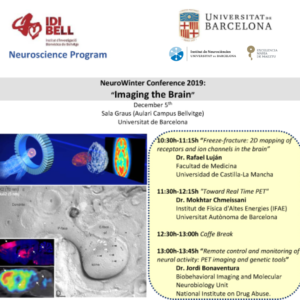
-
Tue10Dec20193:30 PMAuditori Dr. J. Plaza, Sant Joan de Déu
Noèlia Fernàndez-Castillo - investigadora CIBERER, Universitat de Barcelona, IRSJD
Resum:
Els trastorns psiquiàtrics son trastorns complexos en els quals hi participen tant factors genètics com ambientals. Mitjançant estudis genètics podem identificar gens implicats en aquests trastorns, i en els darrers anys hi ha hagut avenços considerables en la identificació d'aquests factors genètics de risc, que en part són comuns entre diferents trastorns psiquiàtrics i que expliquen la seva elevada comorbiditat. És fonamental entendre els mecanismes pels quals aquests gens contribueixen als trastorns psiquiàtrics i existeixen diferents models animals, eines i testos de comportament que es poden fer servir per a estudiar aquests mecanismes i entendre la fisiopatologia d'aquests trastorns. La nostra recerca es basa en identificar aquests gens i estudiar-los mitjançant models animals per entendre millor aquests mecanismes, i potser en un futur desenvolupar futures teràpies farmacològiques.
-
Fri24Jan202012:00 PMAula 11, Clinic Campus
Antonio Strafella | University of Toronto, Toronto, ON, Canada
Thilo Van Eimeren | University of Cologne, Germany
Abstract
Differential diagnoses between Parkinsonian syndromes pose significant challenges for clinicians as clinical manifestations can overlap and there are no gold standard biomarkers. Multimodal translational approaches from novel molecular makers using positron emission tomography (PET) to the brain connectomics by means of magnetic resonance imaging (MRI) could help to elucidate the underlying brain mechanisms of parkinsonisms and their clinical prognoses.
-
Tue28Jan20203:00 PMSala de Graus, Facultat de Psicologia, Campus Mundet
Dr. Raquel Jimenez Pasalodos - Universidad de Valladolid and Universitat de Barcelona (ERC Artsoundscapes project)
The poster of this talk can be downloaded from here
-
Thu06Feb20203:00 PMSala de Graus, Mundet Campus
Tobias Reichenbach, PhD | Imperial College London
Abstract
Understanding speech in noisy backgrounds requires selective attention to a particular speaker. Humans excel at this challenging task, while current speech recognition technology still struggles when background noise is loud. The neural mechanisms by which we process speech remain, however, poorly understood, not least due to the complexity of natural speech. Here we describe recent progress obtained through applying machine-learning to neuroimaging data of humans listening to speech in different types of background noise. In particular, we develop statistical models to relate characteristic features of speech such as pitch, amplitude fluctuations and linguistic surprisal to neural measurements. We find neural correlates of speech processing both at the subcortical level, related to the pitch, as well as at the cortical level, related to amplitude fluctuations and linguistic structures. We also show that some of these measures allow to diagnose disorders of consciousness. Our findings may be applied in smart hearing aids that automatically adjust speech processing to assist a user, as well as in diagnostics of brain disorders.
-
Fri07Feb202011:00 AMSala d’Actes Aulari Universitat de Barcelona: Escola Universitaria D'Infermeria, L'Hospitalet de Llobregat
Invited talk - Learning from amnesia: clinical and theoretical insights from hippocampal dysfunction
Chris Butler |Imperial College London/University of Oxford
Abstract
Memory impairment is common in neurological disease and is often associated with hippocampal pathology. Pure hippocampal amnesia is, however, relatively rare and its underlying mechanisms are controversial. I will discuss research from patients with both transient and persistent forms of amnesia, which provide insights into memory impairment more broadly and from whom important clinical lessons can be learned. In particular, I will argue that many neuropsychological tests of memory are neither sensitive nor specific to hippocampal disease. Instead, we should be measuring forgetting over prolonged periods of time. Accelerated long-term forgetting is a novel and highly sensitive cognitive marker of preclinical Alzheimer’s disease.
-
Wed12Feb20203:00 PMSala de Graus, Campus Mundet
Dr. Martijn Wokke |The City University of New York (USA), and The University of Cambridge (UK)
-
Thu27Feb202012:30 PMAula Magna, Historical Building UB
Gina Rippon | Aston University
-
Fri28Feb202012:00 PMAula 14, Campus Clínic
Manuel Mameli, PhD - Université de Lausane
Abstract
To delineate the neuronal circuits underlying aversion and reward, and their implications in neuropsychiatric disorders is a current hot-topic in neuroscience. The Mameli’s lab aims to decipher the neurobiology of motivation and provide knowledge for disorders including addiction and depression by using different approaches such as electrophysiology, optogenetics, rodent behavior and molecular biology.
-
Fri06Mar20204:30 AMAula Magna, Facultat de Farmàcia i Ciències de l’Alimentació, Campus Diagonal
Rebecca Carrier, Professor and Associate Chair for Research, Chemical Engineering, Northeastern University, Boston, USA
Abstract
The intestinal mucosal barrier is Transport phenomena in the intestine are highly significant to effective oral drug delivery, nutrient absorption, and interactions between microbes and intestinal tissue. Our in vitro models. Interactions between intestinal lumen contents, including food and microbes, with underlying tissues are currently studied in animal models or simple in vitro culture systems that are limited in their representation of phenomena occurring in the human gut. Thus, we are developing in vitro human gut models that incorporate the microbiome and key cell types (e.g., immune cells) as well as appropriate physical stimuli (e.g., fluid flow). One aspect of permeation through the intestinal membrane, transport through mucus, is being investigated in detail. Results to date highlight the dependence of mucosal permeation on physical and chemical properties of penetrating material (drug, particle, microbe) as well as the significance of intestinal lumen contents in altering the mucus barrier. Our findings suggest that mild stimuli, such as those presented by food, can modulate the intestinal mucosal barrier, for example to impact oral drug delivery or microbial invasion, as occurs in infection and intestinal inflammation
-
Fri06Mar202010Aula de la Secció de Psicologia Quantitativa, Departament de Psicologia Social i Quantitativa, 4th floor, 3rd vagon, Faculty of Psychology, Campus Mundet
Deadline to get enrolled: 27 February
Register here
The objective of the workshop is to have an overview of the Postdoctoral opportunities offered by the European, Spanish and Catalan system and provide the participants with the necessary tools to find a Postdoc anywhere. The number of participants is limited to 20 people to guarantee the quality of the workshop. Junior Postdocs and PhD students at the end of their PhD programme under the supervision of a member of the Institute will be prioritized. Your admission will be confirmed as soon as possible and no later than a week before the workshop.
-
Thu12Mar20202:30 PMAula 15, Manuel Corachan, Faculty of Medicine, Campus Clínic
Deadline to get enrolled: 4 March
Register here
The objective of the workshop is to have an overview of the Postdoctoral opportunities offered by the European, Spanish and Catalan system and provide the participants with the necessary tools to find a Postdoc anywhere. The number of participants is limited to 20 people to guarantee the quality of the workshop. Junior Postdocs and PhD students at the end of their PhD programme under the supervision of a member of the Institute will be prioritized. Your admission will be confirmed as soon as possible and no later than a week before the workshop.
-
Mon16Mar2020Sun22Mar2020
-
Sat11Jul2020Wed15Jul2020Glasgow
Proposal Submission Deadline: Monday, May 20, 2019 – 23:59 HAST
-
Wed22Jul2020Fri24Jul2020
-
Tue22Sep2020Thu24Sep2020
-
Wed28Oct2020
-
Thu05Nov2020
-
Sat14Nov2020
-
Mon16Nov2020
-
Mon23Nov2020Fri27Nov2020online event
Dilluns, 23 de novembre
· Nombres i bits contra la pandèmia
Dimarts, 24 de novembre
· La nanotecnologia contra la COVID-19 i molt més enllà
· L'alimentació en temps de COVID-19
Dimecres, 25 de novembre
Dijous, 26 de novembre
Divendres, 27 de novembre
· La pandèmia informativa i comunicativa
-
Mon23Nov2020
-
Tue24Nov20204:00 PMonline event
Dr Mariela Trinchero | Fundación Instituto Leloir
-
Wed25Nov2020Sat28Nov2020
-
Tue01Dec2020Wed02Dec2020
-
Tue01Dec2020
-
Wed02Dec2020Thu03Dec2020online event
La Jornada de presentación de Horizonte Europa en España se celebrará durante las mañanas de los días 2 y 3 de diciembre y se retransmitirá a través de Internet. La agenda de la Jornada e inscripciones están disponibles a través del siguiente enlace.
El objetivo fundamental de la Jornada es dar a conocer a las entidades españolas los objetivos, la estructura y las prioridades de Horizonte Europa, el próximo Programa Marco de Investigación e Innovación de la Unión Europea para el periodo 2021-2027.
El evento está organizado por el CDTI y el Ministerio de Ciencia e Innovación, con la colaboración de la Comisión Europea y la FECYT.
-
Tue08Dec2020
-
Wed09Dec20204:00 PMonline event
Here you have a funny opportunity to learn what investors expect from you and how to give it to them:
- Gain key insights on how to pitch to investors
- Let a VC describe what your first date with an investor is going to be like
As part of the initiative “Brain Health for Life” (15-16D), we have organized this informal webinar:
Nailing your first meeting with investors
Wednesday 9th Dec from 16h to 17:30h CET
Agenda:
16 - 16:20h Pilar Puig, Biocat. From the entrepreneur’s side: How to prepare your pitch, pitch deck & one-pager16:20 - 16:40h Laura Rodríguez, In Vivo Ventures. Interaction with VCs: First meeting and evaluation process
16:40 - 17h Q&A
17-17:30h - Pitches of projects/companies participating at Brain Health for Life. Chair: Núria Martí, Director of Innovation, Biocat
Register HERE for free!
This webinar is part of ToHealth program, an EIT Health activity. The course is organized by Biocat, Institut Guttmann and “la Caixa” Foundation, with the collaboration of the Institute of Neurosciences of the Universitat de Barcelona, Meditecnologia and Medicen Paris, under the framework of B·Debate.
-
Fri11Dec2020
-
Tue15Dec2020Wed16Dec2020
-
Tue15Dec2020Fri18Dec2020
-
Wed03Feb2021
Sessió en línia organitzada per l’Àrea Internacional de l’AGAUR amb la participació de les NCPs Laura Mohedano i Estefanía Muñoz. Inscripcions a principis d’any.
-
Thu11Feb2021online event
Registration:
This event is free but registration is required.
Please register using the following form before Februrary 8th, 2021:
https://forms.gle/W8kacCeoXB5GfyZb7
You can find the program-at-a-glance and the full program here:
-
Thu18Feb2021
A càrrec Nikolaos Floratos (en anglés). Inscripcions a principis d’any.
-
Wed10Mar2021Fri12Mar2021
The 10th Meeting on Neuroacanthocytosis Syndromes will be held online from 10th to 12th March 2021.
Registration is free of charge and you can invite you colleagues to participate, they only need to register to attend too.
There will be sessions for scientists, patients & caregivers, check our preliminary program in the website.
If you are a researcher in the field, we encourage you to present a poster. Deadline for abstract submission is 20th February 2021.
-
Mon15Mar2021Sun21Mar2021
See our talks here!
-
Thu18Mar2021
-
Mon12Apr2021Thu15Apr2021online event
The British Neuroscience Association will host its fifth Festival of Neuroscience, in partnership with the UK Dementia Research Institute in April 2021. Online and worldwide: take a new look at neuroscience at #BNA2021.
-
Wed14Apr2021Fri16Apr2021
-
Mon19Apr2021Thu29Apr2021
-
Thu29Apr20213:00 PMonline event
Myrthe Plaisier – Eindhoven University of Technology
-
Fri30Apr2021
The deadline for submission is: 23:59 (AEST) 30 April 2021
-
Thu13May20213:00 PMonline event
David Luque - Universidad Autonoma de Madrid / Universidad de Málaga
-
Fri14May20211:00 PMonline
-
Wed26May20213:00 PMonline
Programa
15:00. Saludo e introducción. María Blasco, directora del Centro Nacional de Investigaciones Oncológicas (CNIO) y presidenta de la Alianza de Centros Severo Ochoa y María de Maeztu (SOMMa); José María Martell, director del Instituto de Ciencias Matemáticas (ICMAT) y Ana Bravo, presidenta de la Comisión de Igualdad del ICMAT.
15:20. Mesa redonda: “Políticas de igualdad en ciencia”. Participan: María Blasco; Zulema Altamirano, directora de la Unidad de Mujeres y Ciencia del Ministerio de Ciencia e Innovación; y Rosina López-Alonso Fandiño, vicepresidenta de Organización y Relaciones Institucionales del Consejo Superior de Investigaciones Científicas (CSIC). Modera: Patricia Fernández de Lis, redactora jefa de Ciencia y Tecnología de El País.
16:30. Conferencia Donna Ginther, profesora distinguida y directora del Institute of Policy and Social Research de la Universidad de Kansas, EE.UU.
17:30. Clausura: Noelia Vera, secretaria de Estado de Igualdad y contra la Violencia de Género.
El evento se retransmitirá en directo simultáneamente por la plataforma Zoom y el canal de YouTube del ICMAT. Nos gustaría invitar a los miembros de SOMMa a asistir a través del siguiente enlace de Zoom, para facilitar su intervención en el acto en los momentos indicados. El público ajeno a SOMMa podrá conectarse a través del canal de YouTube, por lo que os rogamos que únicamente difundáis de forma pública el siguiente enlace de YouTube.
-
Thu27May202110:00 AMClúster Salud Mental Cataluña- Sant Boi de Llobregat
-
Thu27May20213:00 PMonline event
Ernest Mas Herrero- Brainvitge - Institute of Neurosciences UB
-
Mon31May2021online event
-
Thu03Jun20213:00 PMonline
Laura Dugué - Integrative Neuroscience and Cognition Center CNRS - UMR 8002 & Université de Paris
-
Wed09Jun202111:40 - 13:00 amonline
Stress: mechanisms, consequences and evidence for treatment.
-
Thu17Jun20213:00 PMonline
Serena Sabatini - University of Exeter
-
Tue22Jun20219:00 AMAula Magna de l’edifici històric de la UB, retransmissió en streaming
Per veure la jornada en streaming entreu aquí.
Agenda
9h - Benvinguda institucional (VR recerca o rector)
9h15-10h15 Taula Rodona: la iniciativa NewSpace a Catalunya (50+10min)
Moderador: X. Luri (ICC)
Ponents (confirmats)
○ Daniel Marco (Director general d'Innovació i Economia Digital GenCat)
○ Ignasi Ribas (Director IEEC)
○ Jordi Corbera (Gestor programa PCOT, ICGC)
○ Mònica Roca (Presidenta cambra de comerç de Barcelona)
10h15-10h30h Pausa
10h30-10h45 Introducció: els instituts de la UB (Albert Díaz, delegat del rector pels instituts de la UB)
10h45-13h45 Ponències dels instituts (15min per ponència)
• L’exploració de l’heliosfera interior: la clau per entendre el temps espacial (ICC)
• L'exploració espacial en els videojocs (IRE)
• La internet interplanetària (UBICS)
• Astroquímica (IQTC)
• Economic Impact of Space Science and Exploration: Evidence from the UK (BEAT)
[Torn obert de preguntes]
• El dilema del metà a Mart. El punt de vista d'un ecòleg. (IRBio)
• El cervell a l’espai (UBNeuro)
• Les tecnologies de teledetecció ambiental a Mart com a la Terra (IdRA)
• Caracterització a la nanoescala per a l’exploració del cosmos: EELS de meteorits (IN2UB)
• Mirant el cel cercant-hi Déu (IRCVM)
[Torn obert de preguntes] -
Wed23Jun2021Thu24Jun2021
-
Wed30Jun2021
-
Mon05Jul2021Tue06Jul2021
-
Mon12Jul2021Fri16Jul2021online
The deadline for submission is 22nd June 2021 (17:00 CET). All applicants will be notified on the selection results by 30 June 2021.
-
Tue13Jul2021
-
Mon26Jul2021Sun01Aug2021
-
Mon23Aug2021Wed25Aug2021
-
Wed15Sep2021Mon27Sep2021
-
Fri24Sep2021
-
Fri01Oct2021
-
Wed13Oct2021
-
Wed20Oct2021Fri22Oct2021
-
Wed20Oct2021Fri22Oct2021Alicante
Abstract must be submitted online no later than August 31st, 2021 and authors must be registered to attend this workshop.You will be notified by the Scientific Committee about results of acceptance before September 15th.
-
Wed27Oct202111:00 - 12:00 am
Webinar: Els acords transformatius i el seu impacte a la Universitat de Barcelona.
-
Wed03Nov202113:00 amAula 17 - Campus Clínic Facultat de Medicina, Universitat de Barcelona
-
Tue23Nov2021
-
Thu25Nov2021from 14:30Sala Antoni Caparrós - Edifici del Teatre- Campus Mundet
Agenda & more:
Thursday 25th November – Sala Antoni Caparrós – Edifici del Teatre (Campus Mundet) 14:30h Registration 15:00 – 16:30 PhD session with Scientific Advisory Board (SAB) members of the Institute of Neurosciences of UB · 15:00 – 15:15 - SAB Presentation - brief introduction of each
· 15:15 – 15:30 - PhD Committee Presentation - What’s de PhD Committee?, What we do?, here you will know them, they are the organisers of this workshop!
· 15:30 – 16:30 – Parallel Mentoring Round tables (1 for each SAB member) – Each session will be led by one of our SAB members.
You need to register to the session you are more interested to attend to.
In this mentoring sessions you will have the chance to interact with Senior Researchers from other institutions who you can mirror to in your future, prepare your questions to them!
16:30 – 16:45 Break 16:45 – 19:00 Workshop - Improvisational Leadership (by Performing Ideas) - this is one of the few companies in Europe specialized in teaching Improvisational Leadership, which looks at how to lead in complex unexpected situations when there is no plan and important decisions need to be made fast. 19:00 – 20:00 Improshow Event & beverage (by Planeta Impro) at the Mundet canteen – just fun time, is your chance to interact with other PhD Students of UB on the Neuroscience field in a relaxed atmosphere, share your interests, ideas, research, etc… -
Sat01Jan2022Sun16Jan2022
-
Tue11Jan202212:00 PM
La Agencia Estatal de Investigación anuncia la nueva convocatoria de Proyectos Colaboración Público-Privada. En este Webinar se describirán aspectos más concretos de la convocatoria
-
Wed12Jan2022
-
Tue18Jan2022
-
Mon24Jan2022Sun24Apr2022
-
Thu03Feb2022
-
Fri11Feb2022
-
Tue01Mar2022Sat05Mar2022
-
Thu10Mar2022
-
Tue15Mar2022Sun20Mar2022
-
Tue22Mar202211:30 AMUniversity of Barcelona
Invited talk by Reinoud Kaldewaij
-
Wed06Apr20226:30 PMSocietat Catalana de Farmacologia
Ponent: Dr. Christian Griñan. Modera: Jordi Camarasa
Connexió activa a partir de les: 18:15h Contrasenya: farmacologia
Per iniciar o unir-se a la videoconferència, cal connectar-se a:
https://interacsalut.webex.com/interacsalut/j.php?MTID=m067e4bfe2b6380edeeab85a0ea0167e9
-
Fri08Apr20229:00 - 12:00
Organizer: Gunter Schumann, Fudan/Charite
Join Zoom Meeting
https://us02web.zoom.us/j/9131340607?pwd=ZlBOS0EvM3hxVmx0dG12QjhhYTR2QT09
Meeting ID: 913 134 0607
Passcode: 12345
-
Thu21Apr202212:00 PMFacultat Medicina, Campus Bellvitge
Speaker: Dr. Corette Wierenga
-
Fri22Apr202210:00 - 13:00
Organizer: Sylvane Desrivieres, KCL
-
Mon25Apr2022Wed04May2022
-
Wed27Apr202212:00 PMFacultat de Medicina i Ciències de la Salut (Campus Clínic)
-
Thu28Apr2022
-
Tue03May20223:30 PMUniversity of Barcelona
On-site: Classroom 11 of Medicine Faculty of Clinic Campus
On-line (Zoom): https://us05web.zoom.us/j/86179785212?pwd=clgxWlM2bTlEdDBHdjRoRmc4SEhtQT09
Meeting ID: 861 7978 5212
Passcode: y5cCfs -
Thu05May2022
-
Fri06May2022Fri13May2022StartUB!
+ 1 ECTS a tots els participants
3 premis de 500€
Possibilitat d’inscripció en equip -
Fri13May20229:00 - 18:00Edifici Històric - Universitat de Barcelona
-
Wed18May2022Fri20May2022Sant Feliu de Guíxols
Spanish Society of Neuroscience
Program: bit.ly/37OwidT
-
Fri20May20229:00 - 16:00Campus Bellvitge
Submit your attendance and/or poster (title) submission interest by email to Neuroidibell@gmail.com before May 13th at 12 pm
-
Mon23May20229:00 - 12:00
Organizer: Andre Marquand, Donders Institute
-
Wed25May20225:00 PM
Speaker: Mel Slater, Investigator and Co-director of the Event Lab, University of Barcelona
-
Tue31May202212:00 PMUniversity of Barcelona
Speaker: Dra. Michaela Chiapalone
Place: Aula Dolors Aleu (14, 5th floor) - Campus Clínic
-
Thu02Jun202211:00 AMAcadèmia de Ciències Mèdiques de Catalunya i Balears
-
Tue07Jun2022Wed08Jun202210:00 AMInstitut d'Estudis Catalans
-
Tue07Jun202211:30 AMFacultat Psicologia UB
Speaker: Virginia Penhune
-
Tue07Jun2022
-
Wed08Jun2022Fri10Jun2022
-
Wed08Jun20225:00 PM
Speaker: Beatrice de Gelder, Professor and Director of the Brain and Emotion Laboratory, University of Maastricht
-
Mon13Jun202212:00 PMFacultat Psicologia UB
Speaker: Dr. Robert Zatorre
-
Wed15Jun20225:00 PM
Speaker: Doron Friedman, Professor and Head of InstituteThe Advanced Reality Lab, University of Reichman
-
Thu16Jun202212:00 PMCampus Clínic
Speaker: Dra. Shruti Bhatt
-
Thu16Jun2022
-
Thu16Jun20224:30 PMISTAART
Panelist: Roser Sala-Llonch and Andrés Damián
-
Wed22Jun20225:00 PM
Speaker: Darian Meacham, Associate Professor, University of Maastricht
-
Fri24Jun2022
-
Mon27Jun202212:00 PMAuditori Esteve, c/Rosselló 149-153, Bcn
Speaker: Anna Wang Roe
-
Mon27Jun202212:30 PMSala Miquel Siguan (Sala de Graus) Facultat de Psicologia - Campus Mundet
-
Wed29Jun202211:00 AMAula 2101 (Facultat de Psicologia - Campus Mundet)
Speaker: Carlo Semenza
-
Wed29Jun20225:00 PM
Speaker: Andrzej Nowak, Professor, University of Warsaw
-
Fri01Jul202212:30 PMCampus Bellvitge
Speaker: Hernán López-Schier
-
Sat02Jul2022
-
Tue05Jul20229:00 - 13:00
Organizer: Bernd Carsten Stahl, DMU
-
Wed06Jul2022Fri08Jul2022
-
Sat09Jul2022Wed13Jul2022
-
Thu21Jul202212:00 PMAula 10 (Facultat de Medicina - Campus Clinic)
Speaker: Salvador Martínez Pérez
-
Thu01Sep202212:00 PMSala d'Actes, Pavelló de Govern, Universitat de Barcelona-Campus Bellvitge
-
Wed14Sep202212:00 PMAula Magna (Campus Clínic)
Speaker: Dra. María Llorens-Martín
-
Mon19Sep20223:00 PMAula 11 - Campus Medicina Clínic
-
Mon19Sep20224:00 PMAula 11 - Campus Medicina Clínic
Speaker: Thilo van Eimeren, MD
-
Wed21Sep2022Wed28Sep2022
-
Wed21Sep20227:00 PMBiblioteca de Tiana
Agnès Pérez
-
Fri23Sep20223:00 PMAula 14 (Dolors Aleu i Riera), Campus Clínic
Speaker: Jordi Abante Llenas
-
Thu29Sep20223:00 PMSala Juntes (Victòria Sau) (Facultat de Psicologia - Campus Mundet)
NCS2022: Predictive attenuation of self-generated touch in human somatosensory cortex and cerebellum
Speaker: Konstantina Kilteni
-
Fri30Sep20227:00 PMCosmo Caixa
-
Tue18Oct20221:00 PMSala Miquel Siguan (Graus) - UB Campus Mundet
Speaker: Dra. Clara Paz
You can also follow the talk by Zoom:
Join Zoom Meeting
https://ub-edu.zoom.us/j/98070939909?pwd=aW45d0tWSGxUdnNVNUdQZ0pCbktRUT09
Meeting ID: 980 7093 9909
Passcode: 497575
-
Wed19Oct2022Fri21Oct2022Maó - Menorca
XXXVII Trobades Científiques de la Mediterrània – Josep Miquel Vidal
-
Wed19Oct2022
-
Fri21Oct202211:30 AMSala d'Actes (Pavello de Govern) - UB Campus Bellvitge
Speaker: Professor John Suckling
You can also follow the talk by Zoom:
Join Zoom Meeting
https://ub-edu.zoom.us/j/92756568572Meeting ID: 927 5656 8572
-
Mon24Oct2022Sun30Oct2022
-
Tue25Oct2022
-
Wed26Oct2022
-
Thu27Oct202212:00 PMSala 1, Altell, Centre Esther Koplowiz
Interactions in the local striatal network shape future behaviour
Miriam Matamales, PhD
University of New South Wales, Sydney, Australia
-
Wed09Nov2022Thu10Nov2022Paraninf Campus Clínic
You will be able to follow the Congress online too (link coming soon, register now!)
See more information
-
Sat19Nov20222:00 AMCosmo Caixa
-
Thu24Nov2022CCCB
Això no és un cervell
Sandra Acostoa presenta la recerca amb organoides cerebrals al CCCB en el marc de l'exposició Cervell(s)
-
Thu24Nov20224:00 PMSala Miquel Siguan (Graus) - UB Campus Mundet
Speaker: Dr. Manuel P. Eisner
You can also follow the talk by Zoom:
https://ub-edu.zoom.us/j/98086162956?pwd=MDNoSzdxNnBwaHpZUXhXZDJmQWdHQT09
Meeting ID: 980 8616 2956
-
Tue29Nov2022https://www.alacarta.cat/fetamida/capitol/fet_a_mida_29112022
Dr. Francisco Ciruela participa a la taula sobre Parkinson en el programa “Fet a mida” de La Xarxa
https://www.alacarta.cat/fetamida/capitol/fet_a_mida_29112022
-
Tue13Dec20226:30 PMEroica Caffè, C/Consell de cent 350, Barcelona
¿Por qué nos gusta el chocolate? ¿Qué efecto tiene el café en el cerebro? Si quieres saber más sobre la neurociencia de estos deliciosos productos y disfrutar de un cata en Eroica caffè, apúntate a una merienda MindFood con la Dra. Mercè Pallàs, investigadora de el Institut de Neurociències de la Universitat de Barcelona.
Inscripciones: https://forms.gle/4aBzFan3CM8LTubd8
-
Thu15Dec202212:00 PMAula 209, Aulari del Campus Bellvitge
a talk by Dr. Jordi Magrané from the Feil Family Brain and Mind Research Institute at Weill Cornell Medicine, NY, USA
Hosted by Dr. Jordi Llorens (Departament de Ciències Fisiològiques, UB)
-
Thu09Feb2023Fri10Feb202312:00 PMFaculty of Medicine and Health Sciences, Clinic Campus of the Universitat de Barcelona (Aula Magna)
-
Fri10Feb2023
Les investigadores Ruth de Diego-Balaguer i Joanna Sierpowska expliquen la seva recerca a les escoles en el marc de 100tifiques
La Dra. Ruth de Diego farà una xerrada als alumnes de 6e de primària de l'escola Angela Roca de Viladecans.
La xerrada de la Dra. Joanna Sierpowska es títula "Tenemos una lengua en el cerebro?" i la podran gaudire els infants de l'escola Valldemur-ZER conca de Barbera.
-
Fri10Feb20239:00 AMAula Magna, Aula Magna, Faculty of Medicine and Health Sciences, Clinic Campus of the Universitat de Barcelona
-
Fri10Feb202312:45 PMl'Edifici A de la Facultat Campus Diagonal Sud
Programa:
- Exposició i debat amb joves investigadores: Marta Riba (Margarita Salas, Institut de Neurociències) i Irene Reyes (Maria Zambrano)
- Microteatre: NÈBULA, sobre la vida de Caroline Herschel, la primera dona a establir-se com a científica a Anglaterra al segle XVIII, quan la ciència era un privilegi exclusiu dels homes. A càrrec de Clara Badia Franch (Caroline Herschel), Marc Freixa Muñoz (William Herschel), Albert Lladó Quer (Guió) i Marc Freixa Muñoz (Guió i Direcció)
-
Fri10Feb20237:00 PMAuditori Barradas. Rambla Just Oliveras 56, L’Hospitalet de Llobregat
Ja és aquí la 6a edició del sLHam de dones científiques. El divendres, 10 de febrer, a las 19 h, sis científiques de l’IDIBELL, i dues alumnes de l’IES de Bellvitge pujaran a l’escenari de l’Auditori Barradas de L’Hospitalet per oferir-nos els seus monòlegs. No t’ho perdis! Les estrelles de la vetllada seran… Sandra Acosta (Institut de Neurociències) , Begoña Aran, Lidia Franco, Núria Lloberas, Patricia Prada, Gemma Via, Fatima Akhtar i Paula Barrios! Reserva la teva entrada gratuïta aquí.
-
Sat11Feb202311:00 AMBiblioteca de Tiana
Commemorant el Dia Internacional de les Dones i les Nenes en la Ciència la biblioteca Can Baratau organitza una taula rodona sobre les dones i les carreres STEMA. A aquesta taula rodona participaran Agnès Pérez Millan i Cristina Pulido de l'Institut de Neurociències.
-
Mon13Feb20239:00 AMEscola de primaria Ruben Dario
L'escola de primaria Ruben Dario realitzarà una activitat de divulgació en el marc del dia de la dona i la nena en ciència. Laura Celina de l'Institut de Neurociències respondrà a les pregutes dels alumnes de 4t, 5è i 6è de primaria per tal de proporcionar referents femenins en l'àmbit científic.
-
Wed22Feb202312:00 PMFaculty of Medicine and Health Sciences, Clinic Campus of the Universitat de Barcelona (Aula Magna)
The Faculty of Medicine and Health Sciences hosts the ninth seminar in the Cicle Continuat de Conferències de la FMiCS. Ángeles Rabadán, Senior Associated Scientist and Head of ZeNeuroid (ZeClinics) presents: "MoNNets: An in vitro bioengineerable model of neuronal ensembles"
-
Wed22Feb20237:00 PMSala d'Actes - Centre Cívic Guinardó
Què fa una física estudiant malalties neurodegeneratives amb IA? En la xerrada de l'Agnés Pérez-Millan, investigadora de l'Institut, aprendrem què fa un físic en altres camps, en concret, què aporta el coneixement d'un físic a l'estudi del cervell
-
Mon13Mar2023Fri17Mar2023Instituts de l'àrea metropolitana de Barcelona
Chat | Time travel to discover the mysteries of the brain by researchers from the Institute Martina Trisia Cinca-Tomás and Raquel Aparicio
-
Tue21Mar202312:00 PMFaculty of Medicine and Health Sciences, Clinic Campus of the Universitat de Barcelona (Aula Magna)
The Faculty of Medicine and Health Sciences hosts a new neuroscience conference. Mathieu Roy, SAssociate Professor, dept. of Psychology, McGill University presents: "NO PAIN NO GAIN: how does the brain decide what is the right price to pay to avoid pain?"
-
Thu30Mar20233:00 PMFaculty of Psychology, Mundet Campus of the Universitat de Barcelona (Sala de Graus)
The Faculty of Psychology hosts a new neuroscience conference, Andrew Delamater, Professor and Editor of the Journal of Experimental Psychology: Animal Learning & Cognition, presents: "LEARNING TO PREDICT FUTURE REWARDS: Dissociating Learning ‘What’ Will Happen from ‘When’ It Will Happen"
-
Mon24Apr2023Sun07May2023Antigua Fábrica CACI de Badalona | Fundación Épica La Fura dels Baus, Calle Eduard Maristany 293 08912 Badalona
The initiative's main objective is horizontal collaboration between science, art and technology, involving researchers, creatives and technologists in equal parts. The result, a great collective experiment based on the performing arts that contributes to research, fosters critical thinking in society and puts reflection on plausible futures on the table.
-
Wed26Apr2023Vic
Ens adrecem al públic general i, especialment, a les noves generacions perquè coneguin l’herència humana, científica i artística; el llegat de Santiago Ramón y Cajal.
Busquem despertar la curiositat i la fascinació per la natura i l’experimentació científica.
-
Thu27Apr2023Fri28Apr202312:00 PM
Securing funding is crucial for researchers in Neurosciences throughout all stages in their career. However, applying for funding can be challenging due to the highly competitive nature of the Neurosciences field and the limited time researchers have on hand to prepare a successful application.
To support its researchers in applying for funding, the UBNeuro collaborates since 2020 with the grant consultancy company Hezelburcht. During the talk she is going to present how UBNeuro and Hezelburcht can support you through the grant application process, an overview of current funding opportunities for Neurosciences on a European level, and lastly tips and tricks for preparing an application and finding partners. Questions are very welcome during and after the session.
-
Fri28Apr2023Paraninf de la Universitat de Barcelona
-
Fri05May202312:00 PMFaculty of Medicine and Health Sciences, Clinic Campus of the Universitat de Barcelona (Aula Magna)
International lighting campaign (#LightItUp4HD)
- a mural at the entrance of the UB so that students and citizens who wish can stamp their hands
-
Fri05May20238:30 PMFaculty of Medicine and Health Sciences, Clinic Campus of the Universitat de Barcelona (Aula Magna)
The facade of the Faculty of Medicine and Health Sciences will be lit up in blue (HD visibility for Adults) and violet/lilac (HD visibility for Children)
-
Fri12May2023Sat13May2023
La Festa de la Ciència és un esdeveniment en què la Universitat de Barcelona obre les portes a la ciutadania per fer accessible, d’una manera innovadora i engrescadora, la recerca que duu a terme. La vàlua d’aquesta activitat es fonamenta en el rigor científic de la proposta, ja que són els grups de recerca mateixos els que proposen i elaboren, en col·laboració amb la Unitat de Cultura Científica i Innovació (UCC+I) de la institució, els tallers que s’hi fan.
-
Mon15May202310:00 AM
The inphinit fellows:
- Ignacio Roura
- Stella Nicolaou
- Marcos Galán
-
Wed17May2023
Más de 80 representantes de la Alianza de Excelencia de Centros Severo Ochoa y Unidades María de Maeztu (SOMMa) se han reunido en Bilbao para analizar las últimas tendencias en la evaluación de la investigación científica.
Crónica sobre la jornada
La grabación de la sesión esta disponible en este enlace
-
Mon22May2023Bar la Iguana
Un cervell prodigiós Quan pensem en "un cervell prodigiós" de seguida ens ve al cap el nom d'Einstein, Leonardo da Vinci o Mozart, sense adonar-nos que el cervell més prodigiós del món el tenim molt més a prop del que imaginàvem: al nounat.
-
Mon22May202310:00 AMWebinar
En este webinar informativo se tratarán aspectos prácticos de preparación de propuestas para los proyectos posdoctorales MSCA PF 2023
-
Wed31May202310:00 AMBarcelona
 L’objectiu és donar a conèixer projectes que utilitzen aquesta tecnologia com a eina terapèutica per millorar la salut i l'atenció de diferents col·lectius, i poder compartir coneixement i sinèrgies entre organitzacions sanitàries i de l’àmbit social que hi estan interessades.
L’objectiu és donar a conèixer projectes que utilitzen aquesta tecnologia com a eina terapèutica per millorar la salut i l'atenció de diferents col·lectius, i poder compartir coneixement i sinèrgies entre organitzacions sanitàries i de l’àmbit social que hi estan interessades.Hi haurà presentacions de projectes de l’Hospital Vall d’Hebron, Hospital d’Olot, Suara, Sant Joan de Déu Sociosanitari, IAS Girona o l’Instituto de Investigación Sanitaria de Aragón, entre d’altres, així com un espai de demostració de la tecnologia immersiva i un networking amb refrigeri.
-
Thu08Jun20237:00 PMLa Muriel
We’ll have some short and informal talks, followed by plenty of time for discussion and networking. So grab a drink, meet new people, and share your love for neuroscience with us!
-
Tue20Jun202316:30 - 19:30Faculty of Medicine and Health Sciences, Clinic Campus of the Universitat de Barcelona (Aula Magna)
Join us for the conference titled "Towards a Collaborative Neuroscience," where scientists and technologists from the Human Brain Project will present their collaborative research. They will also introduce EBRAINS, an open research infrastructure created by the Human Brain Project, which brings together data, tools, and computing facilities for brain-related research.EBRAINS aims to transform neuroscience by accelerating collaborative brain research. At this event, we are excited to present EBRAINS to the Barcelona neuroscience community, offering an opportunity to explore its potential firsthand.Following the scientific presentations, we invite you to a networking session where you can connect with fellow attendees.
-
Thu22Jun20233:30 PMFaculty of Psychology, Mundet Campus of the Universitat de Barcelona (Sala de Graus)
The Faculty of Psychology hosts a new neuroscience conference, Dr. Ulrike Krämer from the university of Lübeck. She is presenting: "THE INFLUENCE OF SOCIAL PRESENCE ON EMPATHY"
-
Sat01Jul2023Fri01Sep20238 online sessions
The environMENTAL project is delighted to host a consensus conference to give citizens and interested audiences a chance to interact with the project, learn what it does, question the researchers and shape the course of the research.
-
Sat01Jul2023Thu06Jul2023from 9:30 am to 6:00 pm every dayCRG – Centre for Genomic Regulation, Dr. Aiguader 88 08003 Barcelona, Spain
This intensive 6 days hands on course will be composed of talks from renowned international experts in the fields and the sessions will include both theoretical background and hands on practice. Each day will start with a theoretical overview and talks of the particular subfield (keynote talks will be streamlined online). This will be followed by a more in depth theoretical session directly linked to the practical session in the afternoon. Practical sessions are going to take place in the CRG training facilities, consisting of fully equipped wet and cell culture labs. The analysis and evaluation of the results will be performed in the CRG bioinformatics teaching laboratory.
Organized by Sandra Acosta member of the Institue of Neurosciences of the University of Barcelona and Laura Batlle Centre for Genomic Regulation (CRG).
Registration deadline: 1st May 2023 (Only online registration is accepted)
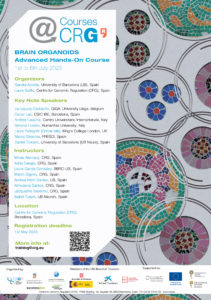
-
Wed12Jul202312:00 PMFaculty of Psychology, Department of Clinical Psychology and Psychobiology
The Faculty of Psychology hosts a new neuroscience conference!
Dr Serena Sabatini, Institute of Mental Health, School of Medicine, University of Nottingham and Dr Fiona Rupprecht, Department of Developmental and Educational Psychology, University of Vienna will talk about the self-perception of aging.
Engage in this interesting matter at hand!
Self perceptions of ageing chart
More about the Neuroscience Conference Series
-
Tue05Sep202310:00 AMFaculty of Medicine and Health Sciences, Clinic Campus of the Universitat de Barcelona (Aula Magna)
The Faculty of Medicine and Health Sciences hosts a new neuroscience conference!
Dr Edgar T. Walters from the University of Texas Health Science Center at Houston, McGovern Medical School and the Department of Integrative Biology and Pharmacology; will be presenting: "PERSISTENT PAIN: mechanisms and functions in nociceptor cell bodies "
More about the Neuroscience Conference Series
-
Fri08Sep202311:00 AMWebinar
Los proyectos deberán inscribirse en las áreas de matemáticas, psicología, ciencias de la atmósfera, oceanografía e investigación del clima.
Los investigadores principales españoles que opten a estas ayudas deben cumplir, entre otros los siguientes requisitos:
- Pertenecer a entidades de investigación sin ánimo de lucro.
- Contar con experiencia previa en proyectos financiados por la AEI u otros como ERC Grants, proyectos de H2020 y Horizonte Europa.
Más información en:
Link del webinario: https://us06web.zoom.us/j/87581670872
-
Wed20Sep2023Sun15Oct2023Facultat de Medicina i Ciències de la Salut
L'exposició "C
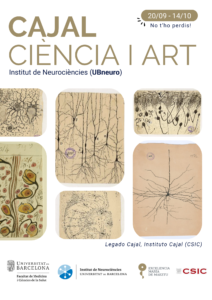 ajal, Ciència i Art" presenta facsímils de les obres mestres de Cajal -conservats i cedits per Legado Cajal, Instituto Cajal (CSIC)- que revelen la seva extraordinària habilitat per capturar la complexitat del cervell humà a través de dibuixos científics que esdevenen veritables obres d'art.
ajal, Ciència i Art" presenta facsímils de les obres mestres de Cajal -conservats i cedits per Legado Cajal, Instituto Cajal (CSIC)- que revelen la seva extraordinària habilitat per capturar la complexitat del cervell humà a través de dibuixos científics que esdevenen veritables obres d'art. -
Wed20Sep2023Sun15Oct2023Facultat de Medicina i Ciències de la Salut
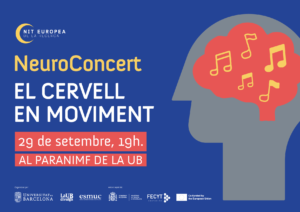 Amb motiu de la celebració de la Nit Europea de la Recerca (European Researchers’ Night) celebrarem una activitat que combina la música en directe, les neurociències i les explicacions de persones expertes en música, per tal de donar a conèixer els efectes que pot tenir la música en els oients.
Amb motiu de la celebració de la Nit Europea de la Recerca (European Researchers’ Night) celebrarem una activitat que combina la música en directe, les neurociències i les explicacions de persones expertes en música, per tal de donar a conèixer els efectes que pot tenir la música en els oients. -
Wed20Sep2023
-
Wed20Sep20231:00 PMAula Magna, Facultat de Medicina i Ciències de la Salut
La inauguració de l'exposició "Cajal, Ciència i Art" suposa una oportunitat única per explorar el món fascinant de Santiago Ramón y Cajal, un geni que va fusionar la ciència i l'art com ningú altre.
Aquesta exposició presenta facsímils de les obres mestres de Cajal -conservats i cedits per Legado Cajal, Instituto Cajal (CSIC)- que revelen la seva extraordinària habilitat per capturar la complexitat del cervell humà a través de dibuixos científics que esdevenen veritables obres d'art.
-
Tue03Oct202310Aula 1, CCCB
La jornada es proposa explorar de quina manera pot l’art incidir en la ciència i si les pràctiques artístiques poden ser una font d’investigació per a la recerca científica. A partir de tres converses i una taula rodona, debatrem sobre les col·laboracions entre aquests dos mons de la mà d’artistes i científics en els àmbits de les arts performatives, les arts visuals i la música i sobre què aporten aquestes disciplines al coneixement científic.
Hi participaran Antònia Folguera, Pep Gatell, Lúa Coderch, Pep Vidal, Lluís Nacenta, Júlia Múgica i Lluís Fuentemilla.
Consulta el programa en aquest enllaç i inscriu-te, aquí! Sobretot cal fer inscripció prèvia.
-
Wed04Oct20233:00 PMFaculty of Medicine and Health Sciences, Clinic Campus of the Universitat de Barcelona (Aula Magna)
"pBAE polymers: a new nano delivery platform of nucleic acids for targeted therapies applications''
Cristina Fornaguera
Principal Investigator at IQS School of Engineering(host: Albert Giralt)
-
Fri06Oct202310:00 AMClinic Campus (Aula 2)
The Faculty of Medicine and Health Sciences hosts a new neuroscience conference, Dr. Derek Bowie, Professor of Pharmacology & Therapeutics at McGill University and co-Director of the Cell Information Systems. He will be presenting: "Re-imagining the glutamatergic synapse: From structure-function to neurological disease"
More about the Neuroscience Conference Series
-
Tue10Oct202312:00 PMFaculty of Medicine and Health Sciences, Clinic Campus of the Universitat de Barcelona (Aula Magna)
"Cannabidiol as a potential therapeutic treatment for Leigh syndrome''
Emma Puighermanal
Ramon y Cajal Researcher at Neuroscience Institute (UAB)
(host: Albert Giralt) -
Fri20Oct2023The Historic Building, University of Barcelona Aula 111, Cloister of the Faculty of Filologia Gran Via de les Corts Catalanes, 585
We are pleased to announce this one-day course where the company PICO will introduce its virtual reality products and give attendees hands-on experience of how to create virtual reality applications with Unity. The course course will be in English.
Additional information: Special Virtual Reality Event_PICO
-
Mon23Oct2023Tue24Oct2023
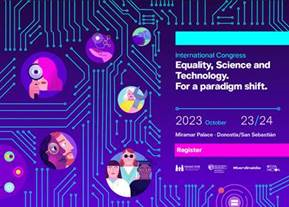
International Congress. Equality, science and technology. For a paradigm shift.
We look forward to welcoming you at the Congress and please spread the word about it.
Program will be constantly updated at: Program
-
Fri01Dec202312:00 PMClinic Campus (Aula 10)

The Faculty of Medicine and Health Sciences hosts a new neuroscience conference, Dr. Ariel Valiente, Scientist at Max Planck Institute for Biological Intelligence, Molecular and Structural Biology, Protein Evolution and Fluorescence Bio-imaging. He will be presenting: "DEVELOPMENT AND APPLICATION OF GENETICALLY ENCODED SENSORS"
More about the Neuroscience Conference Series
-
Mon15Jan202412:00 PMFaculty of Medicine and Health Sciences, Campus Clinic | Aula 10
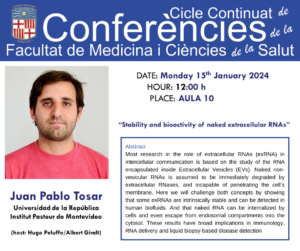
The Faculty of Medicine and Health Sciences hosts a new neuroscience conference: “Stability and bioactivity of naked extracellular RNAs”. Juan Pablo Tosar, Universidad de la República Institut Pasteur de Montevideo, shares his insights on how some exRNAs are intrinsically stable and can be detected in human biofluids, plus that naked RNA can be internalized by cells and even escape from endosomal compartments into the cytosol. These results have broad implications in immunology, RNA delivery and liquid biopsy-based disease detection
More about the Neuroscience Conference Series
-
Thu18Jan20244:30 PMFaculty of Psychology, Campus Mundet | Sala de Graus
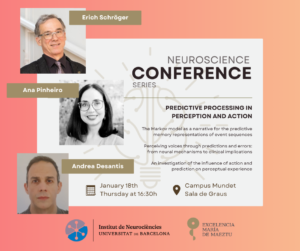
The Faculty of Psychology hosts a new neuroscience conference symposium: Predictive processing in perception and action. Our invited speakers: Erich Schröger, Wilhelm Wundt Institute for Psychology, Leipzig University, Germany; Ana Pinheiro, Faculty of Psychology, University of Lisbon, Portugal and Andrea Desantis, Département Traitement de l’Information et Systèmes, Office National d’Études et de Recherches Aérospatiales, France; will share their valuable insights on:
-
-
-
-
-
-
-
-
-
- The Markov model as a narrative for the predictive memory representations of event sequences
- Perceiving voices through predictions and errors: from neural mechanisms to clinical implications
- An investigation of the influence of action and prediction on perceptual experience
-
-
-
-
-
-
-
-
Predictive processing in perception and action | More about the Neuroscience Conference Series
-
-
Wed24Jan202411:00 AMFaculty of Medicine and Health Sciences, Campus Clinic | Aula Magna
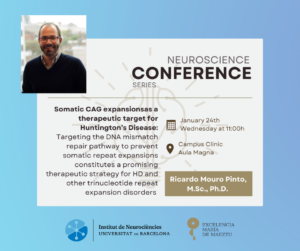
The Faculty of Medicine and Health Sciences hosts a new neuroscience conference: SOMATIC CAG EXPANSIONS AS A THERAPEUTIC TARGET FOR HUNTINGTON’S DISEASE. Ricardo Mouro Pinto, M.Sc., Ph.D. (Center for Genomic Medicine, Massachusetts General Hospital. Instructor in Neurology, Harvard Medical School. Associated
Scientist, Program in Medical and Population Genetics, Broad Institute at MIT and Harvard) shares his insights on how targeting the DNA mismatch repair pathway to prevent somatic repeat expansions constitutes a promising therapeutic strategy for HD and other trinucleotide repeat expansion disorders.Ricardo Mouro Pinto, M.Sc., Ph.D. | More about the Neuroscience Conference Series
-
Fri09Feb20241:30 PMWebinar
Compumedics Neuroscan proudly present the quarterly CURRY Webinar series, NeuroTalks, focusing on sharing research and clinical practices around epilepsy and other primary brain disorders, facilitating communications among scientists and clinicians, and inspiring new advancements within their fields.
Register here: https://register.gotowebinar.com/register/6923178754226237269
For more information, please visit: https://compumedicsneuroscan.com/event/curry-neurotalks-webinar-1/
-
Mon12Feb20244:00 PMPasseig de Gràcia, 129
Vols conèixer les novetats del programa 2024 de l'EIC Accelerator? Tens pensat presentar una proposta pròximament?
Participa en la sessió informativa sobre totes les novetats de l'EIC Accelerator Work Programme 2024. Durant la sessió, Luís Guerra, delegat d'Espanya del Consell Europeu d'Innovació Horizon Europe, explicarà totes les novetats del programa:
- Com fer el procés de sol·licitud simplificat.
- Quin tipus de subvenció pots optar.
- Quines opcions d’inversió directa pot escollir.
- Els diferents reptes de l’accelerador de l’EIC.
- Quins són els suports de serveis de què disposes.
Inscripccions: https://agenda.accio.gencat.cat/inscripcions/-/inscripcio/2024/02/12/yoXQOl5zSac9nz_z85jUAA/?lang=ca_ES
-
Tue13Feb202412:00 PMFaculty of Medicine and Health Sciences, Campus Clinic | Aula Magna
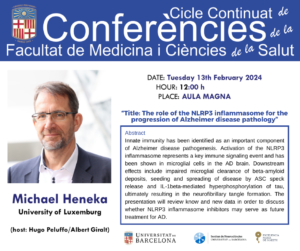
The Faculty of Medicine and Health Sciences hosts a new neuroscience conference: “THE ROLE OF THE NLRP3 INFLAMMASOME FOR THE PROGRESSION OF ALZHEIMER DISEASE
PATHOLOGY”. Michael Heneka, University of Luxemburg, shares his insights on how the innate immunity has been identified as an important component of Alzheimer disease pathogenesis.More about the Neuroscience Conference Series
-
Wed14Feb202414:00 - 15:00hAula Magna Enric Casassas, Facultat de Física UB (planta 0)
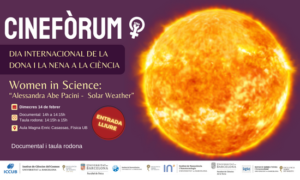
Ens plau convidar-vos a participar en l'activitat organtizada per celebrar el Dia Internacional de la Dona i la Nena a la Ciència d'enguany. Aquest esdeveniment té com a objectiu reconèixer i destacar el paper de les dones en el món de la ciència i inspirar futures generacions de científiques.L'activitat consistirà en un cinefòrum en què es projectarà el documental "Women in Science: Alessandra Abe Pacini - Solar Weather", de 15 minuts de durada. A continuació, es realitzarà una taula rodona amb la participació de diferents investigadores de la Universitat de Barcelona (UB), on es discutiran temes rellevants relacionats amb la presència de les dones en la ciència i els reptes que enfronten.
Us animem a unir-vos a aquesta iniciativa, a compartir les vostres experiències i a ser part d'una conversa enriquidora sobre la importància de la igualtat de gènere en el camp científic..
-
Thu15Feb20247:30 AM
We remind you that these sessions do not require registration and are open to all interested persons, so we ask for maximum dissemination. For more information: https://www.ciberned.es/ciberned-webinar-series/2024-ciberned-webinar-series
Please access the session through the following link: https://teams.microsoft.com/l/meetupjoin/19%3ameeting_OTNkNzk5MTMtOTUzZi00ZDJkLTliZTUtZTZhOGZlZTY5NGVj%40thread.v2/0?context=%7b%22Tid%22%3a%22a0966eb2-54c2-499b-b26f-0830c2531faf%22%2c%22Oid%22%3a%22148e56be-0aea-4c41-93c3-1ef8acc87bdd%22%7d
-
Tue20Feb20243:00 PMFaculty of Pharmacy and Food Sciences
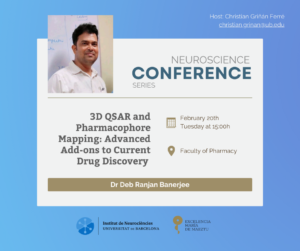
The Faculty of Medicine and Health Sciences hosts a new neuroscience conference: 3D QSAR and Pharmacophore Mapping: Advanced Add-ons to Current Drug Discovery. Dr Deb Ranjan Banerjee, PhD (IIT, India), Postdoc (TAMU, USA) shares his insights.
More about the Neuroscience Conference Series
-
Tue05Mar20247:00 PMCentre Cívic casa Golferichs
La música té un poder universal per mobilitzar i moure les persones. Està present a totes les cultures i, malgrat adoptar formes molt diverses, genera emocions intenses, records perdurables, moments de gran satisfacció i fins i tot estats alterats de consciència. Aquest poder mobilitzar rau en la seva capacitat d'induir i organitzar l'activitat intrínseca de les neurones a través de les ones i els ritmes cerebrals.
A càrrec de Carles Escera, catedràtic de neurociència cognitiva a la Universitat de Barcelona, i investigador de l'Institut de Neurociències en la mateixa universitat.
-
Tue12Mar2024
-
Fri22Mar20249:00 AMParaninf, Facultat de Medicina i Ciències de la Salut, Universitat de Barcelona
A day dedicated to learning, discovery, and discussion on the topics of knowledge and innovation starting from stem cell research. Through lectures, films, visits to laboratories, and recreational moments, students will be able to engage with the contents and methods of science.
UniStem Day is an opportunity to discover that scientific research is (also!) fun and fosters personal and social relationships built on evidence, courage and integrity.
The super network for the 16th edition 2024 is composed of 97 Universities and Research Centres in Australia, Denmark, France, Germany, Hungary, Italy, the Netherlands, Norway, Poland, Serbia, Spain, Sweden and the United Kingdom.
-
Tue09Apr2024Wed10Apr2024CCCB Barcelona, Spain
The metaverse concept is that of a large-scale social environment based on the convergence of virtual and physical reality. Participants can take part in the metaverse through virtual, augmented or mixed reality. They can carry out everyday activities together, ranging from entertainment through to education, business, politics, health or even legal proceedings. At this time the metaverse is more of an idea than a reality, but a number of nascent systems exist, and all the technological components, including solutions involving AI, are available to bring this idea into existence.
Additional information here: https://www.ub.edu/eventlab/EMRN/
-
Wed10Apr20243:00 PMEdifici de Calderes, Campus Mundet
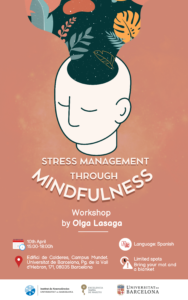 Mindfulness is a powerful practice that can help you cultivate calmness and mental clarity amidst academic and professional demands. During this workshop, we will explore practical mindfulness techniques that you can easily integrate into your daily life to reduce stress and enhance your quality of life. The language of instruction will be Spanish.
Mindfulness is a powerful practice that can help you cultivate calmness and mental clarity amidst academic and professional demands. During this workshop, we will explore practical mindfulness techniques that you can easily integrate into your daily life to reduce stress and enhance your quality of life. The language of instruction will be Spanish. -
Thu18Apr202410:00 AMSala Miquel Siguan | Facultat de Psicologia, Campus Mundet
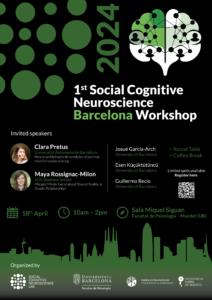 Reserve your spot here: https://www.eventbrite.co.uk/e/entradas-1st-social-cognitive-neuroscience-barcelona-workshop-846888104117
Reserve your spot here: https://www.eventbrite.co.uk/e/entradas-1st-social-cognitive-neuroscience-barcelona-workshop-84688810411710am: Welcome
10h15: Maya Rossignac-Milon
11h: Clara Petrus
11h45: Coffee Break
12h15: Flash talks:
- 12h15: Esen Küçüktütüncü
- 12h30: Guillermo Recia
- 12h45: Josué García
13h: Round table
13h30 Closure
-
Fri19Apr2024
-
Fri26Apr202410:30 AMFaculty of Psychology of the UB, Campus Mundet | Sala de Graus
-
Mon29Apr202412:00 PMFaculty of Psychology of the UB, Campus Mundet | Sala de Graus
-
Thu02May20243:00 PMFaculty of Psychology of the UB, Campus Mundet | Sala de Graus
-
Mon06May202412:00 PMFaculty of Psychology of the UB, Campus Mundet | Sala de Graus
-
Tue07May20248:00 AMSala Miquel Siguan (Graus) | Campus Mundet Facultad de Psicología de la Universidad de Barcelona
Jornada Híbrida | el enlace a la jornada se facilitará por correo una vez inscritos
Inscríbete antes del 3 de mayo: https://docs.google.com/forms/d/e/1FAIpQLScYicA0DxDW3oD5f3EsMXlqGX_gmdTSwyprcVQRdM2FS_R6aA/viewform
Conecta con otros colegas y profesionales del sector, compartiendo experiencias, ideas y soluciones para abordar los desafíos comunes en este ámbito. Al participar activamente en la jornada, recibirás un diploma acreditativo que valida tu asistencia y contribución al evento,
-
Tue07May20243:00 PMFaculty of Psychology of the UB, Campus Mundet | Sala de Graus
-
Wed08May202412:00 PMFaculty of Medicine and Health Sciences Campus Clinic | Aula Magna
-
Thu09May202412:00 PMFaculty of Medicine, Campus Clinic | Aula 13
-
Thu09May20243:00 PMFaculty of Psychology of the UB, Campus Mundet | Sala de Graus
-
Wed15May2024

En el marc del Dia Internacional contra la LGBTIQ+fòbia, des del Vicerectorat d'Igualtat, Inclusió i Gènere, la Unitat d'Igualtat, el Grup de Treball LGBTIQ+ de la Comissió d'Igualtat i la Facultat de Belles Arts organitzem l'acte TransUB: conQUEERint estimes, espais i institucions que tindrà lloc el pròxim 16 de maig a partir de les 17:30h a la Facultat de Belles Arts.
Aquest acte persegueix discutir els reptes i necessitats del col·lectiu trans i no-binari de la universitat. En el context d'una societat cisheteropatriarcal que nega la seva existència, és necessari que generem espais on poder fer visibles les seves experiències i vivències. L'acte compta amb múltiples activitats:
- 17:30h. Obertura de l’espai, a càrrec del Grup de treball LGBTIQ+ de la UB
- 18:00h. Presentació de l'informe Percepció de seguretat i visibilització de l'alumnat trans* i no binari a les universitats catalanes: Universitat de Barcelona i Universitat Pompeu Fabra, a càrrec de Gaizkane Apodaka i Eiden Gael Marín Rodríguez (equip investigador)
- 18:30h. Diàleg entre Tània Navarro i Rubén Antón Conversa entre Tània Navarro, activista trans referent en la història del moviment LGBTIQ+ al nostre territori, i Rubén Antón, artista i investigadora.
- 19:00h. Espai de debat En aquest espai podrem discutir envers l'informe presentat, podent detectar així reptes i necessitats que la UB ha de fer front, com també poder visibilitzar experiències i vivències. Dinamització de l'espai a càrrec de Gaizkane Apodaka i Eiden Gael Marín Rodríguez (equip investigador).
- 19:30h. Exposició artística i performàtica Aquest espai està destinat a qualsevol membre de la comunitat universitària, especialment alumnat, que vulgui exposar els seus projectes artístics i/o performances. Si voleu participar, escriviu-nos un correu a igualtat@ub.edu o contacteu-nos per xarxes socials (@igualtatub).
- 20:30h. Espai musicofestiu, dinamitzat per Àlex Marteen
-
Wed15May2024Thu23May2024
El compromís de tolerància zero de la UB i l’objectiu d’erradicar la violència i conductes masclistes compta amb una eina fonamental de prevenció, atenció i intervenció com és el Protocol de la Universitat de Barcelona per a la prevenció, la detecció i l’actuació contra les situacions d’assetjament sexual o per raó de sexe, identitat de gènere o orientació sexual, i altres conductes masclistes o LGTBIQ+ fòbiques. L’objectiu d’aquest curs és oferir a la comunitat UB (alumnat, PAS i PDI) coneixements sobre els aspectes jurídics associats al protocol vigent a la UB, sobre el seu funcionament i aplicació, així com, sensibilitzar sobre les eines de bona praxi de cura psicològica davant de situacions de violència masclista mitjançant els primers auxilis emocionals.
Dues edicions disponibles:
-
Thu16May202412:00 PMFaculty of Psychology of the UB, Campus Mundet | Sala de Graus
-
Thu16May20243:00 PMFaculty of Psychology of the UB, Campus Mundet | Sala de Graus
-
Thu23May202412:00 PMFaculty of Psychology of the UB, Campus Mundet | Sala de Graus
-
Tue04Jun20243:00 PMFaculty of Psychology of the UB, Campus Mundet | Sala de Graus
-
Thu06Jun20243:00 PMFaculty of Psychology of the UB, Campus Mundet | Sala de Graus
-
Fri14Jun20249:30 AMDept de Ingenierías - Univ. Pompeu Fabra Campus de la Comunicació Sala La Nau, 51.100 Roc Boronat, 138 08018 Barcelona
Objetivos:
-
- Conocer qué son los sesgos -como parte de la cognición implícita humana- y cómo son los sesgos de género en la investigación con sus modalidades más frecuentes
- Ofrecer herramientas para aminorarlos y deseablemente eliminarnos en el trabajo investigador en sí mismo y en las tareas académicas relacionadas (evaluación de proyectos y artículos, selección de personal, trato en los equipos, etc.).
Más información en: https://www.crm.cat/los-sesgos-inconscientes-de-genero-en-la-investigacion/
-
-
Fri14Jun202412:00 PMFaculty of Psychology, Campus Mundet | Sala Victòria Sau
-
Fri28Jun20249:00 AMFaculty of Medicine and Health Sciences, Clinic Campus of the Universitat de Barcelona (Aula Magna)
El día 28 de junio celebramos el día internacional de la fenilcetonuria. Se trata de un paradigma en las enfermedades metabólicas hereditarias, pues ha cambiado su historia natural en las últimas décadas a través del cribado neonatal y el tratamiento precoz. Sin embargo, siguen existiendo restos en el manejo de esta enfermedad, y necesidad de visualización.
Ciber|ER instalará una parada divulgativa en el Hospital Clinic de Barcelona de 9h a 17h donde se proporcionará información sobre esta enfermedad, productos dietéticos asociados a su manejo y se sorteará una cena entre los que contesten un cuestionario sobre la enfermedad, donde participarán grups de UBneuro como equipo investigador y miembros del consorci PKU.cat.
-
Wed03Jul2024Fri05Jul2024Faculty of Medicine and Health Sciences
Als tallers del Cajalidades l’alumnat podrà posar en pràctica i veure amb els seus propis ulls alguns dels aspectes destacats del món de Cajal.
- Art i pigments
- El principi de la fotografia
- El món microscòpic
Més informació i altres dates sobre els tallers: https://www.ub.edu/idp/web/ca/cursos/ips/tallers
Additional information about the project: https://web.ub.edu/es/web/cajalidades/inici

-
Wed13Nov2024Thu14Nov2024
-
Tue26Nov2024Fri29Nov2024University Hospital of Bellvitge
After more than 20 years of experience in using the intraoperative mapping techniques and neurophysiologic intraoperative monitoring for the resection of brain lesions located in supratentorial eloquent areas, we are pleased to offer you a full course which comprises the anatomic and theoretical basis for the implementation of these techniques, some practical sessions (white matter fiber tractography using DTI for intraoperative navigation, fiber dissection and CUSA ultrasonic aspirator usage course both in cadaveric specimens) to finalize with two live broadcast surgeries with the application of the subject taught.
It is mainly a practical course which arises from our department experience. We have designed it in the "how I do it" format, with the participation of the corresponding professionals of all the fields implied in the brain mapping process: from the preoperative planning to the surgery, and even the postoperative follow up. We have enriched the course with our know-how, hoping that this 6th Mapping Course in Bellvitge is useful and enjoyable for all of you, with the plus of the course laying in the marvelous city of Barcelona, which will undoubtedly turn out to be an extra appeal.
https://www.mappingbellvitge.com/index.html



